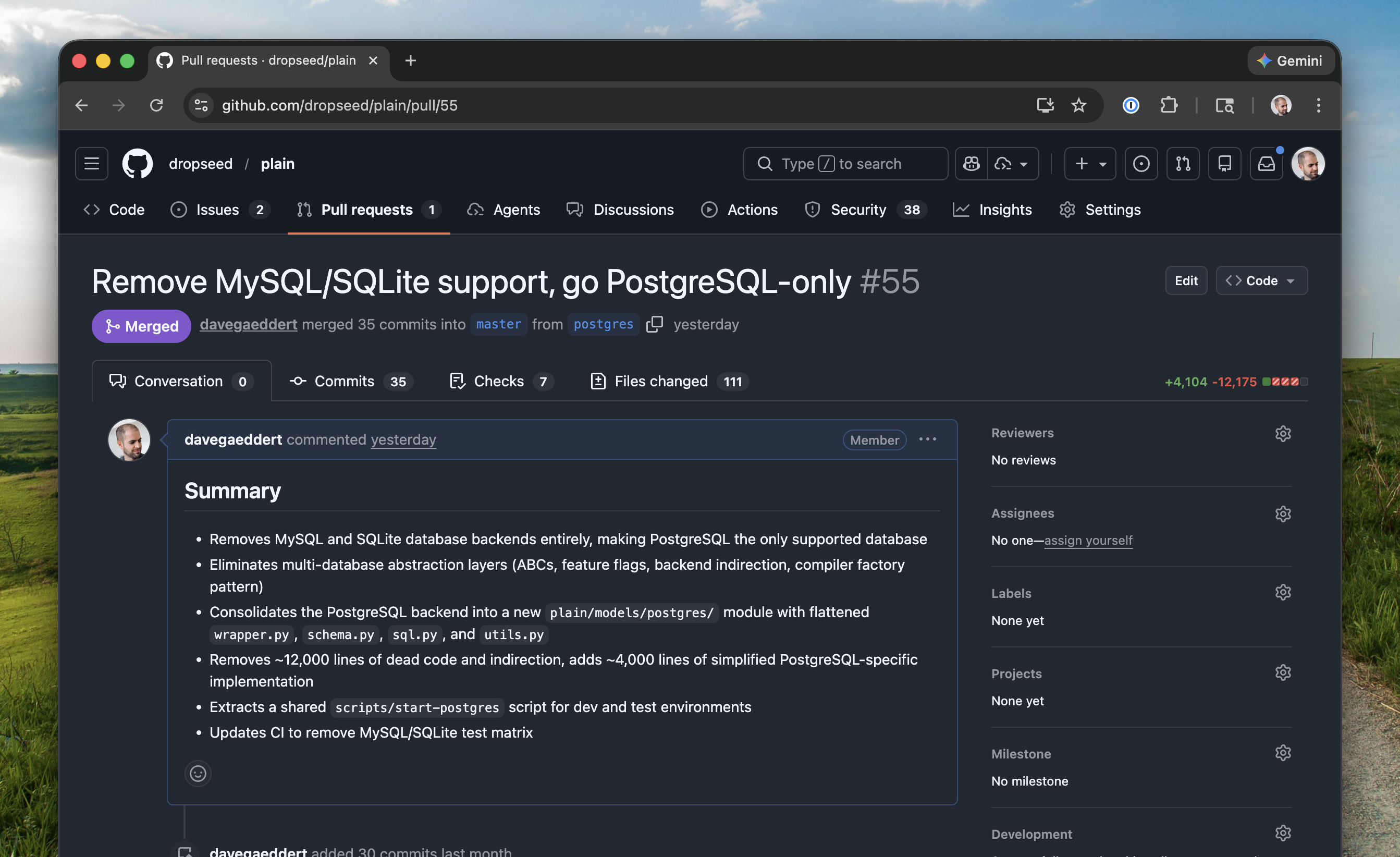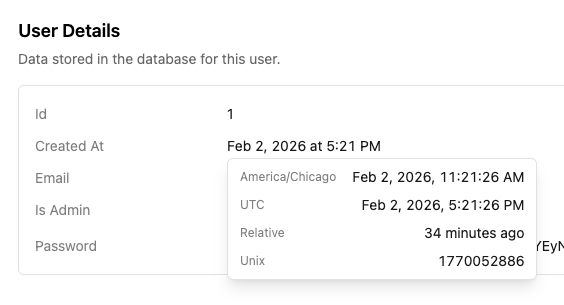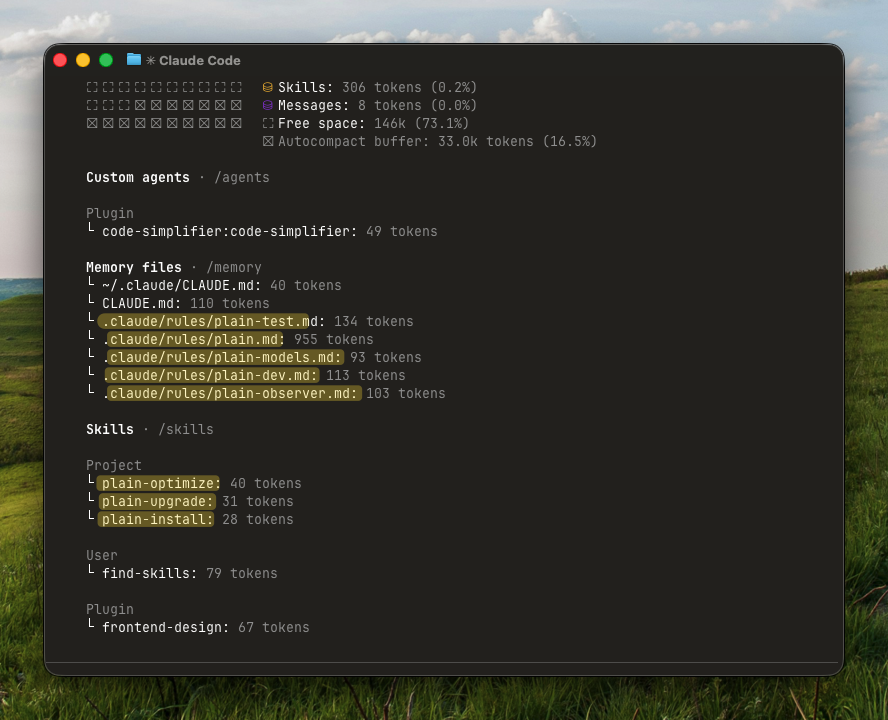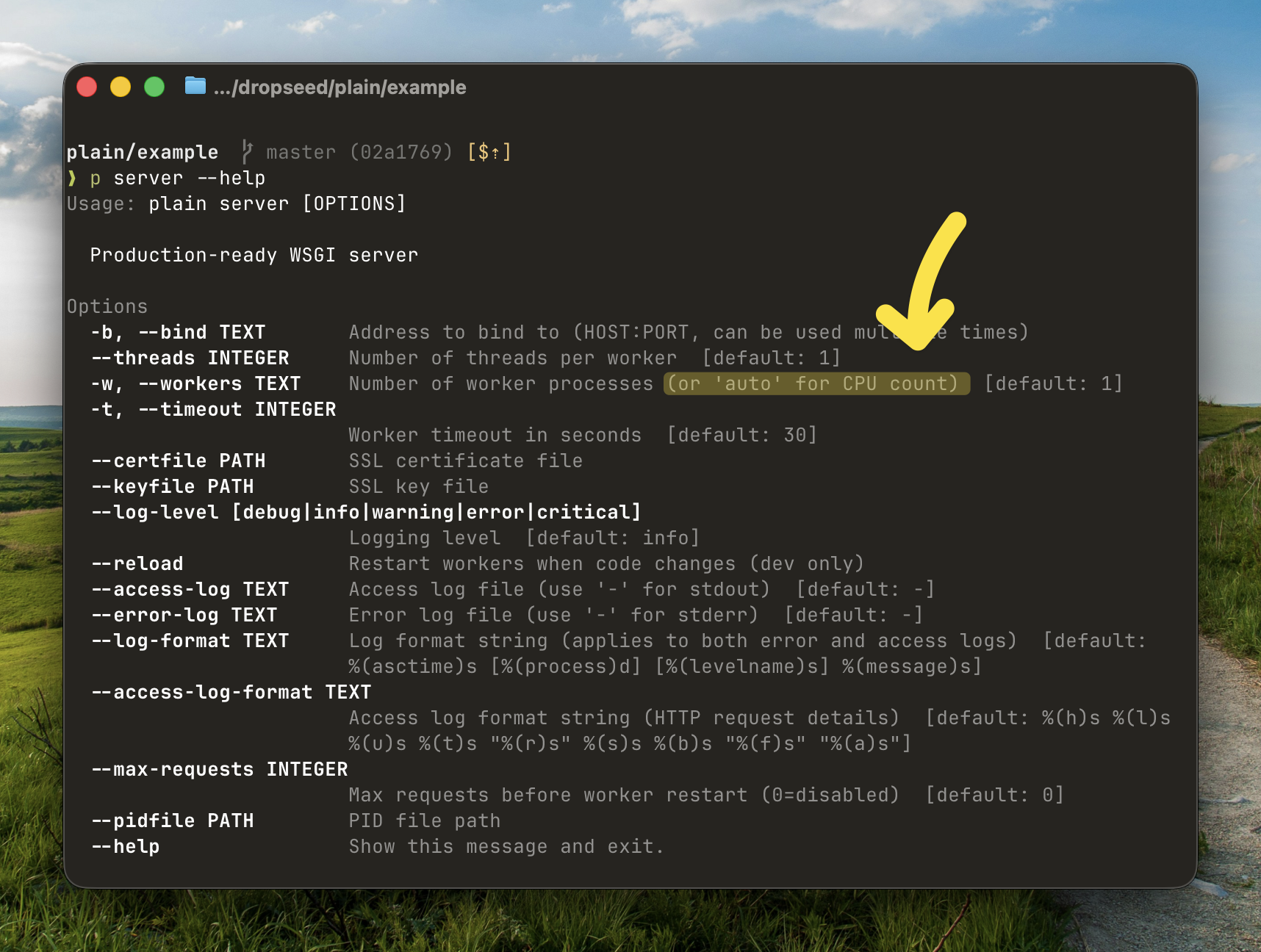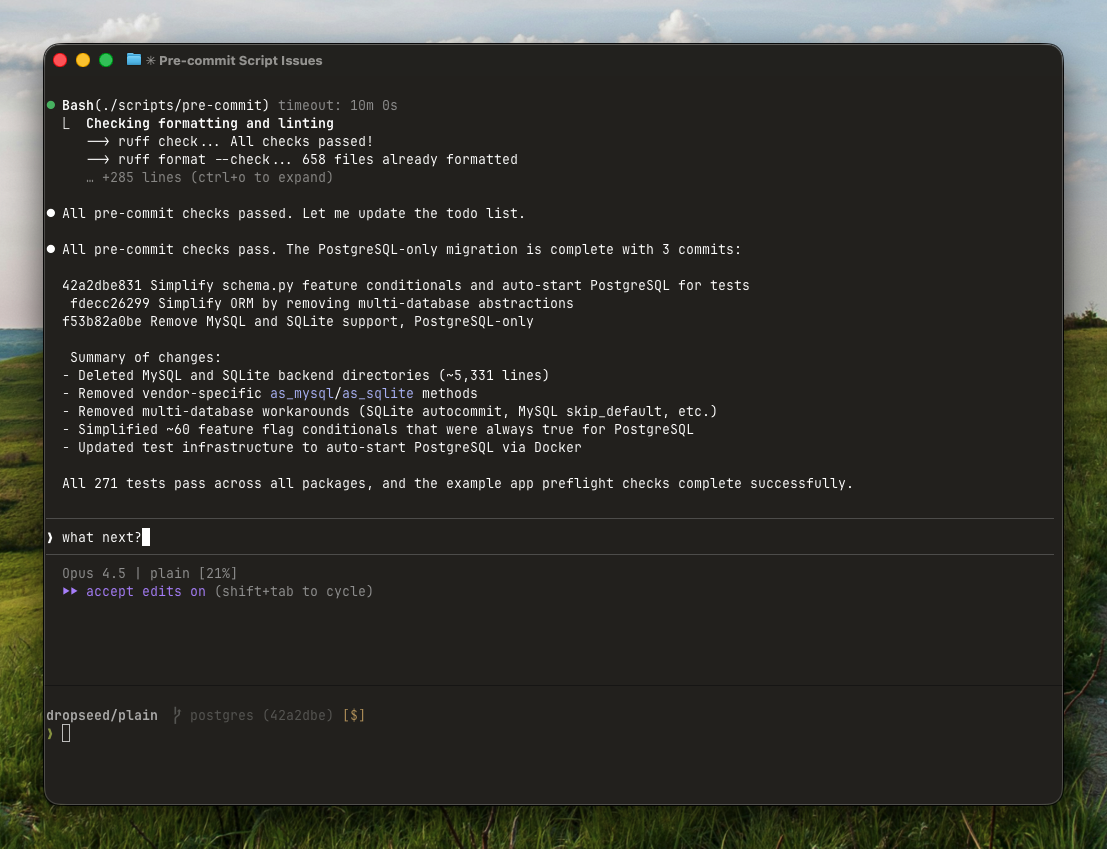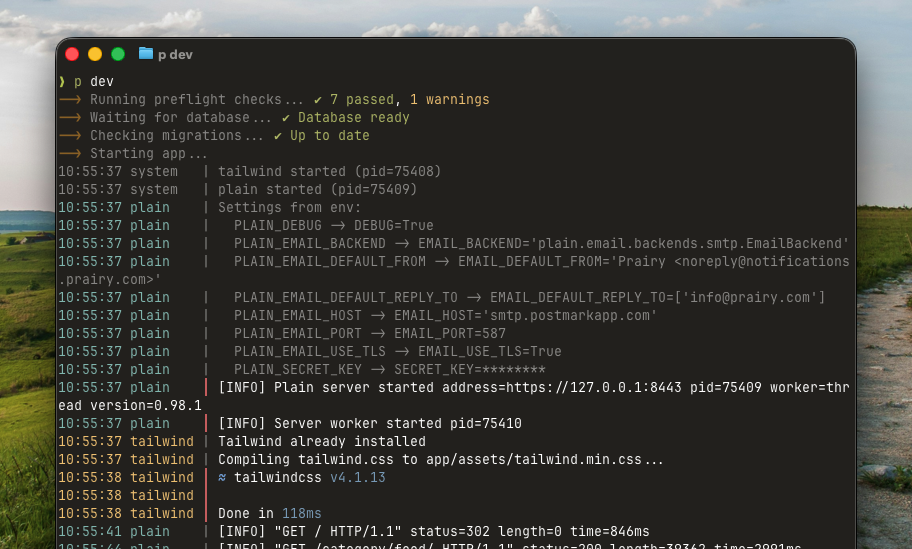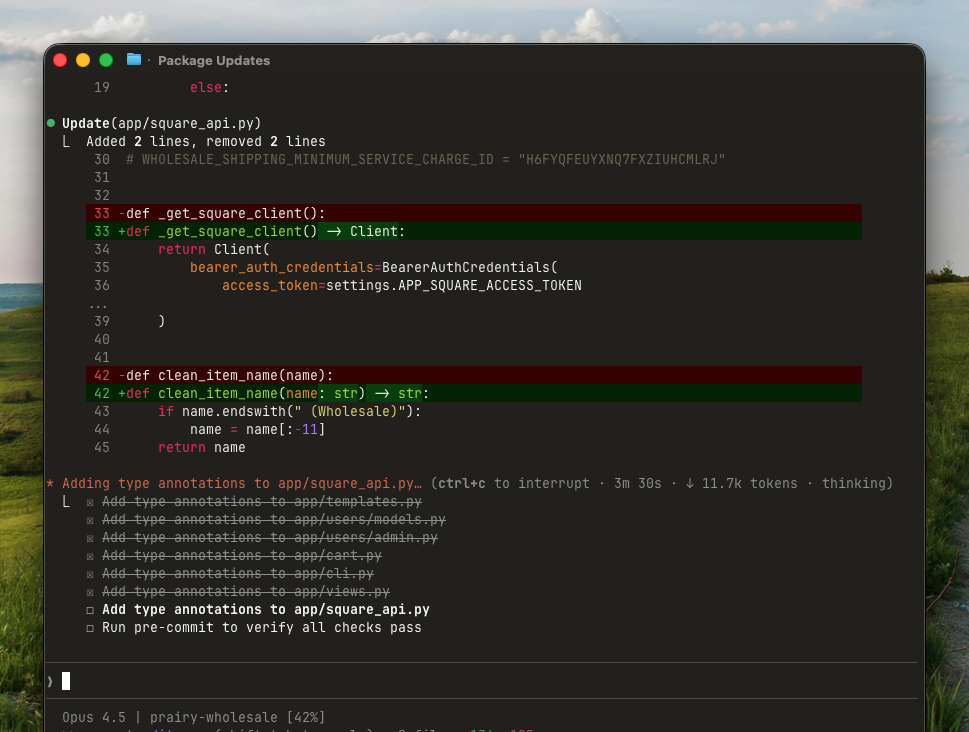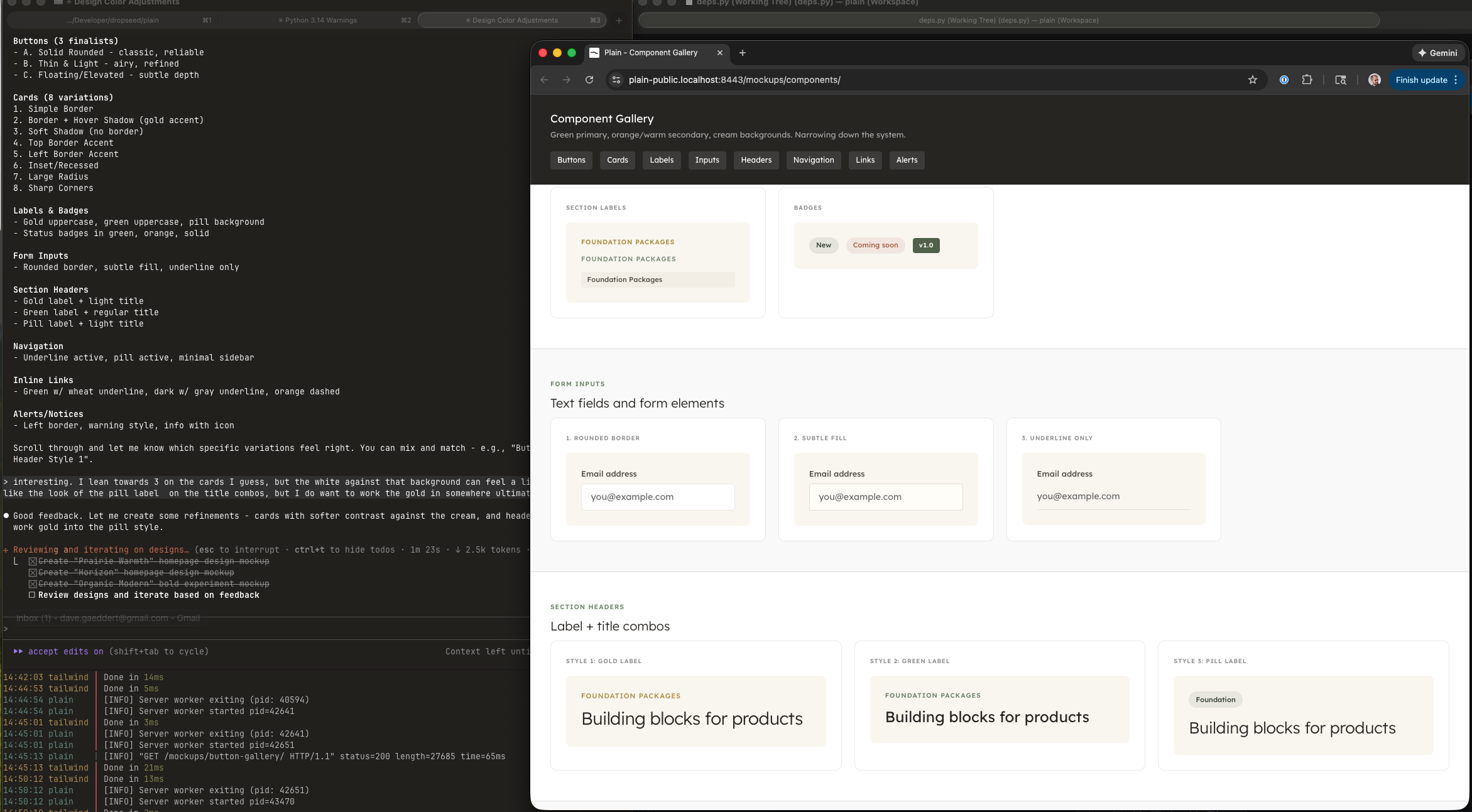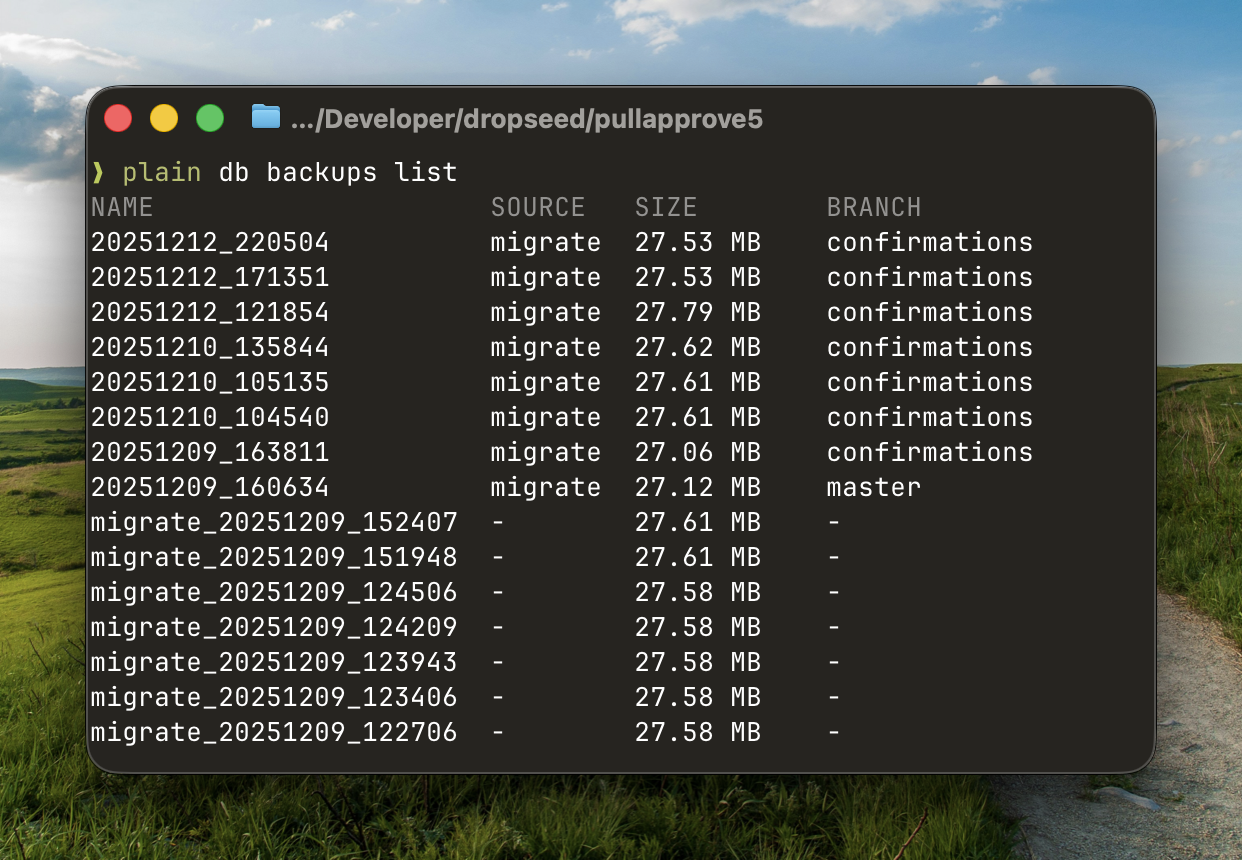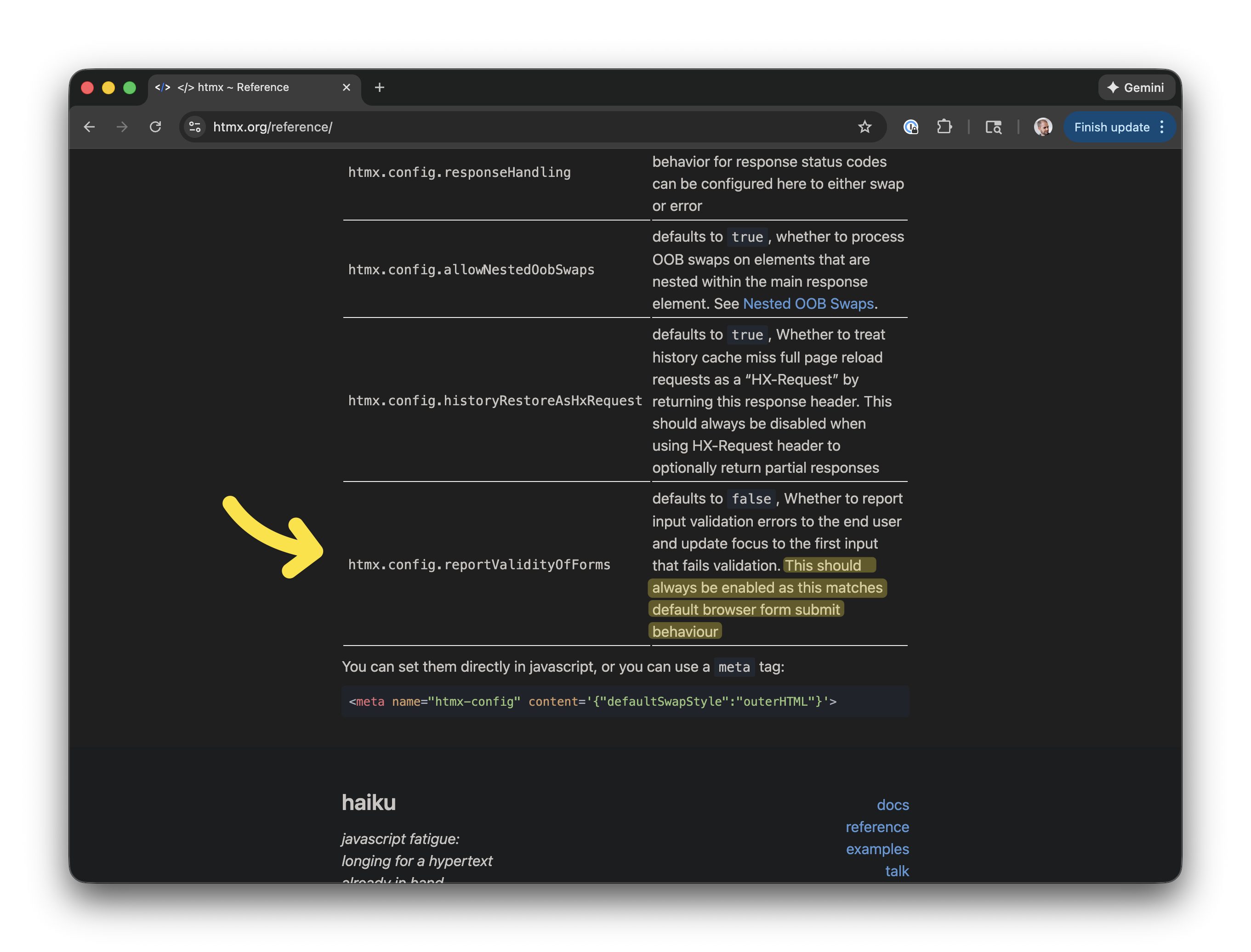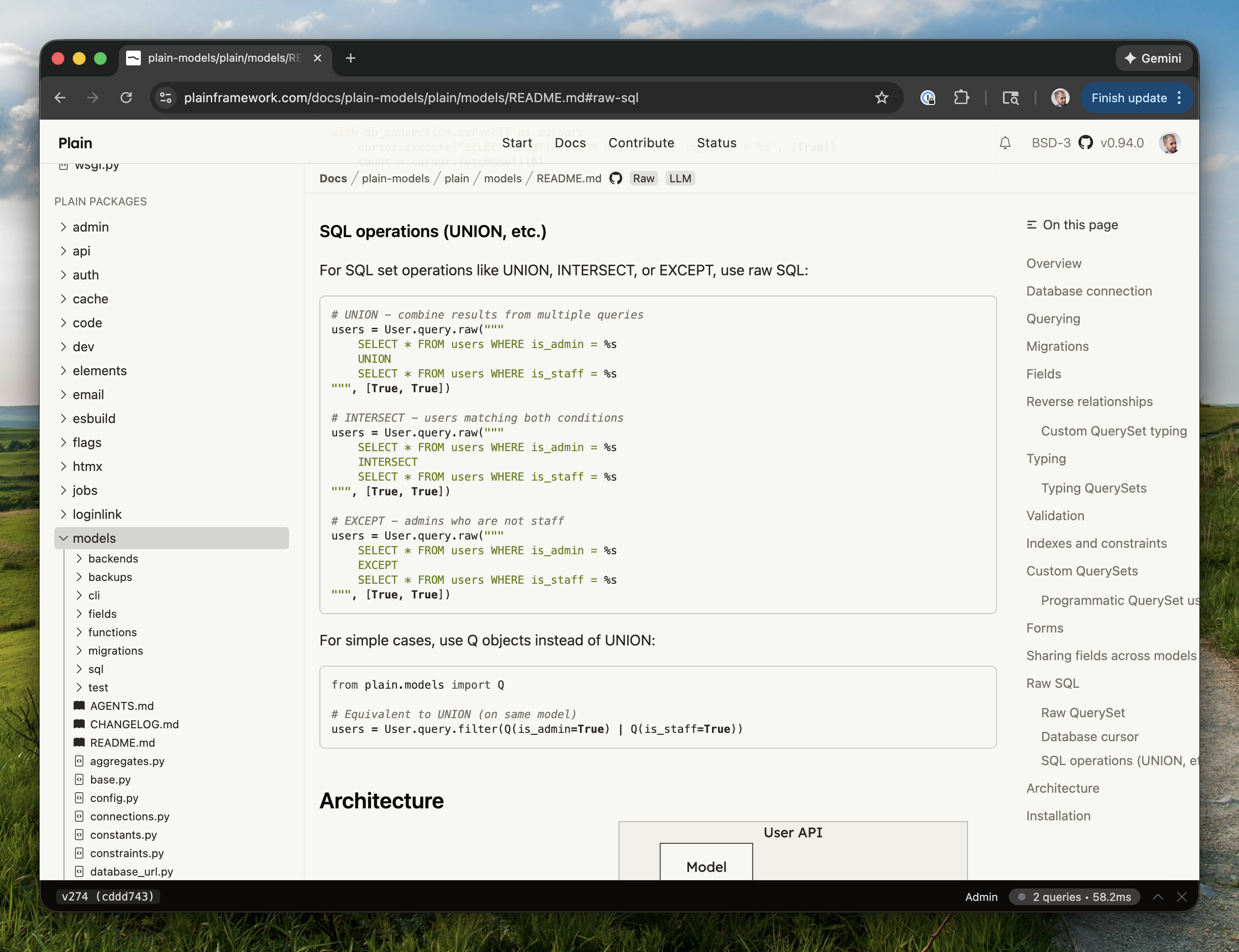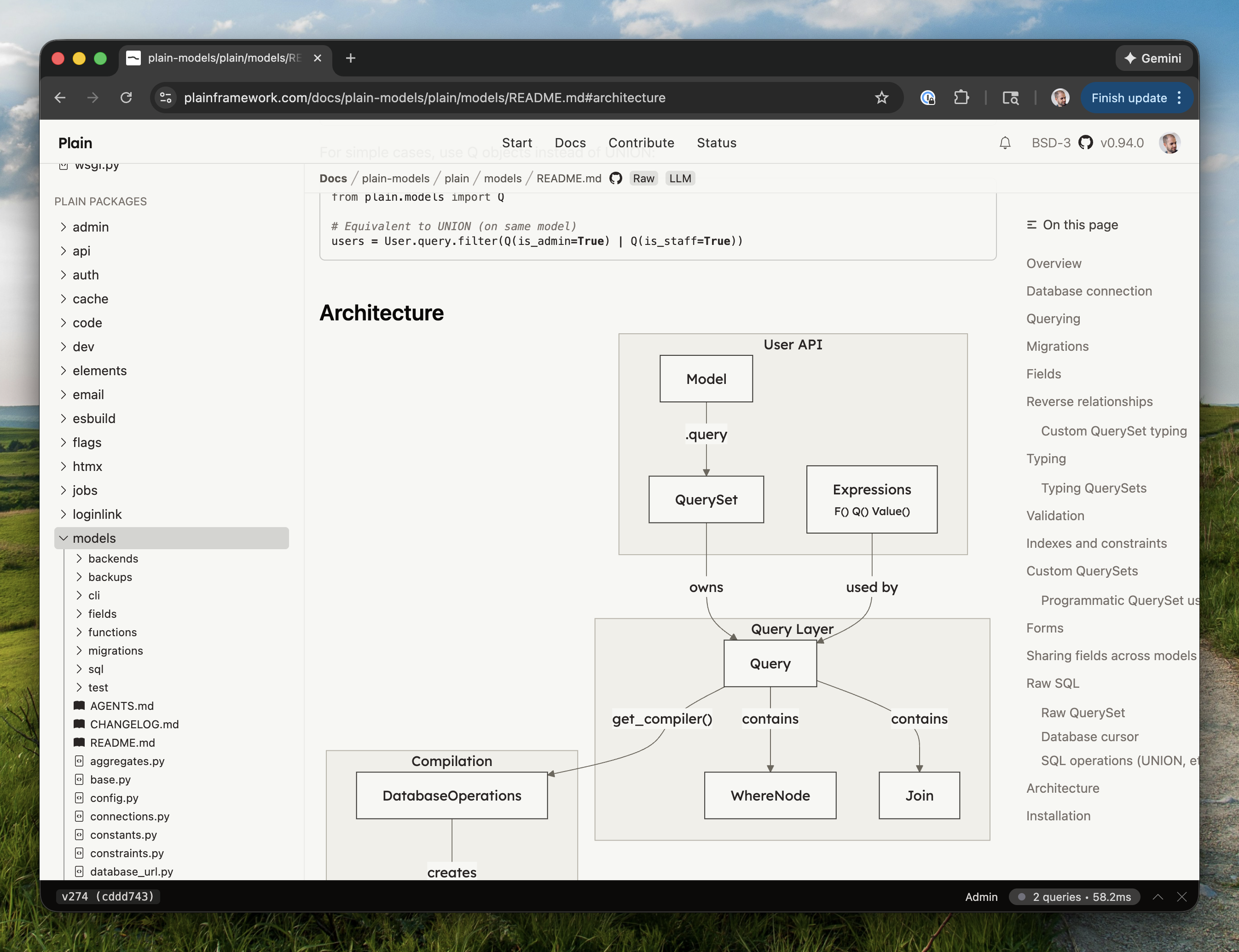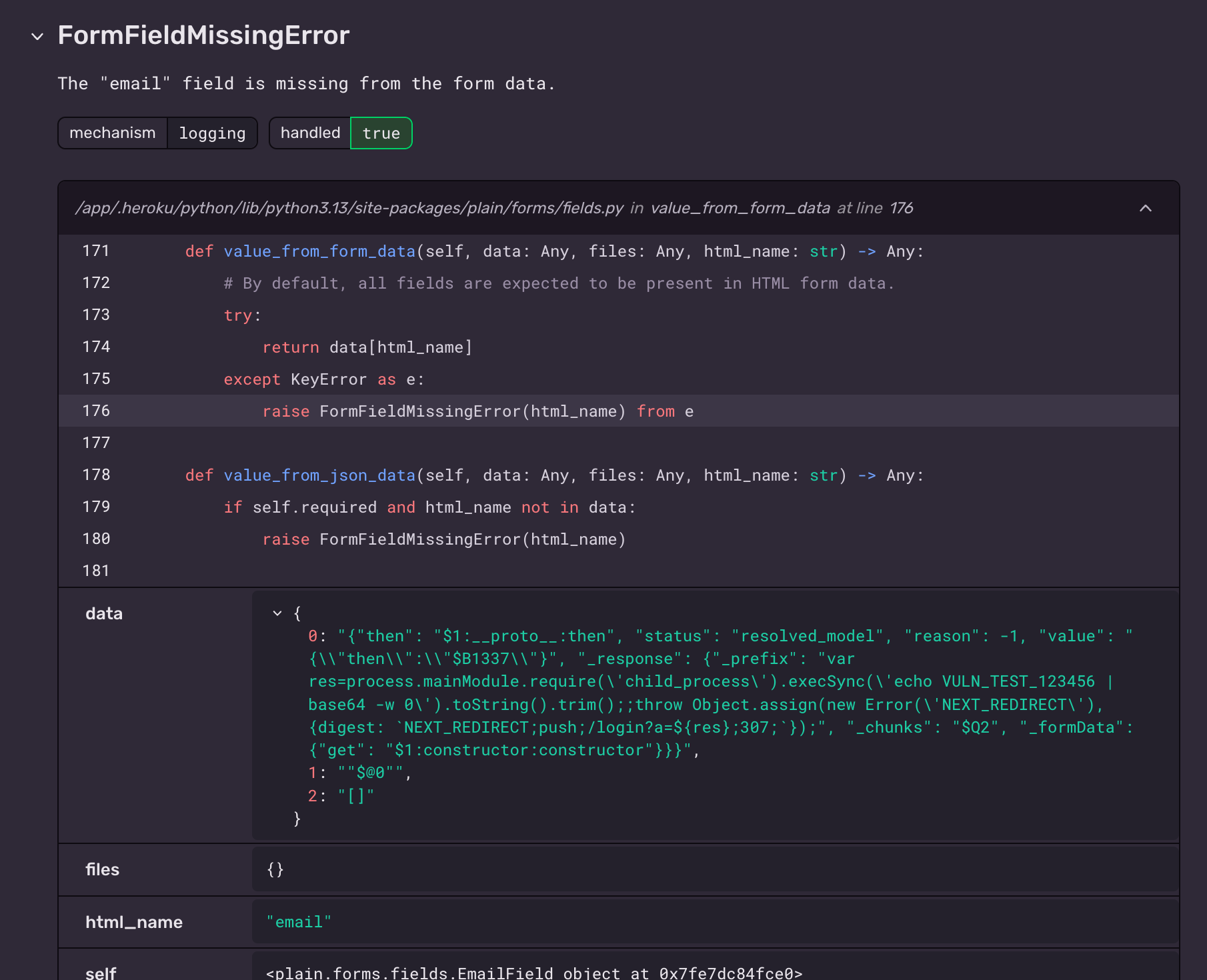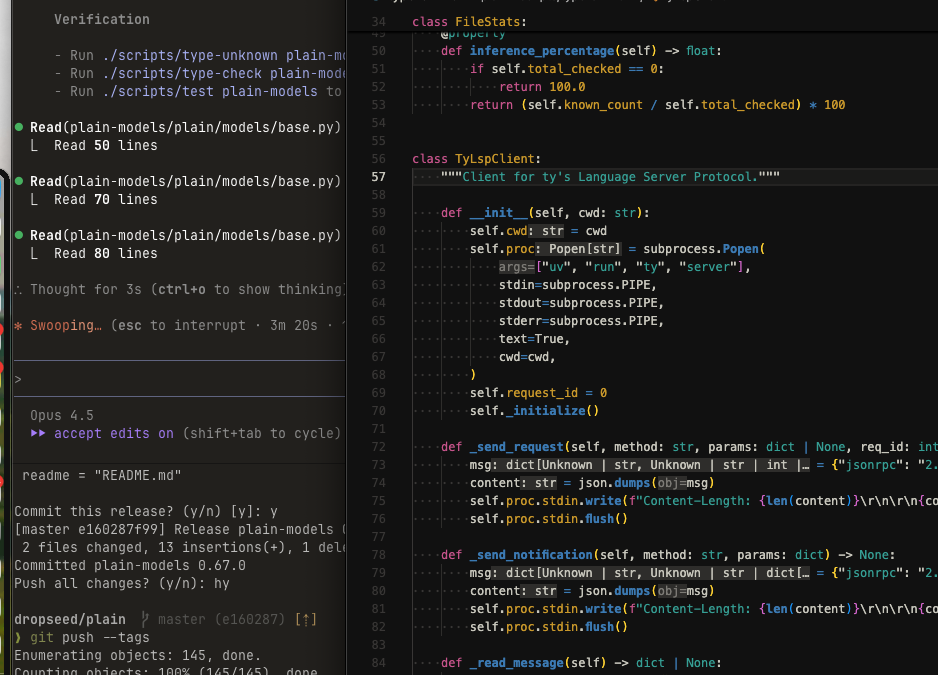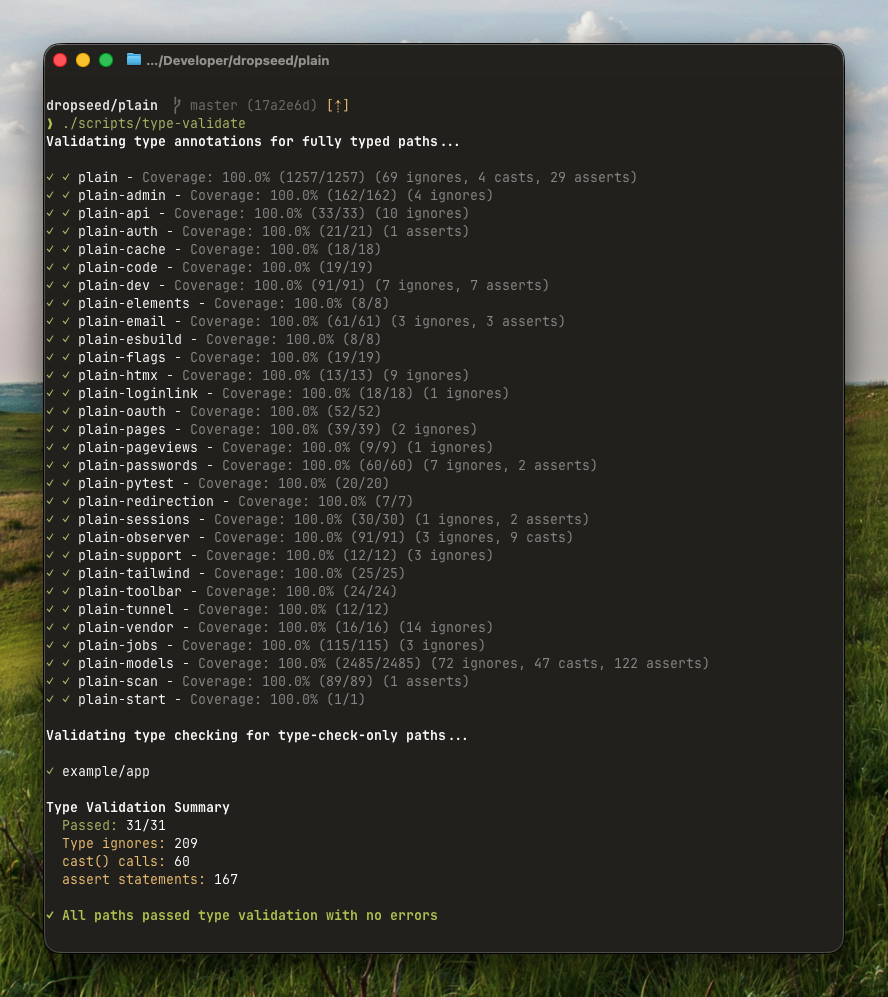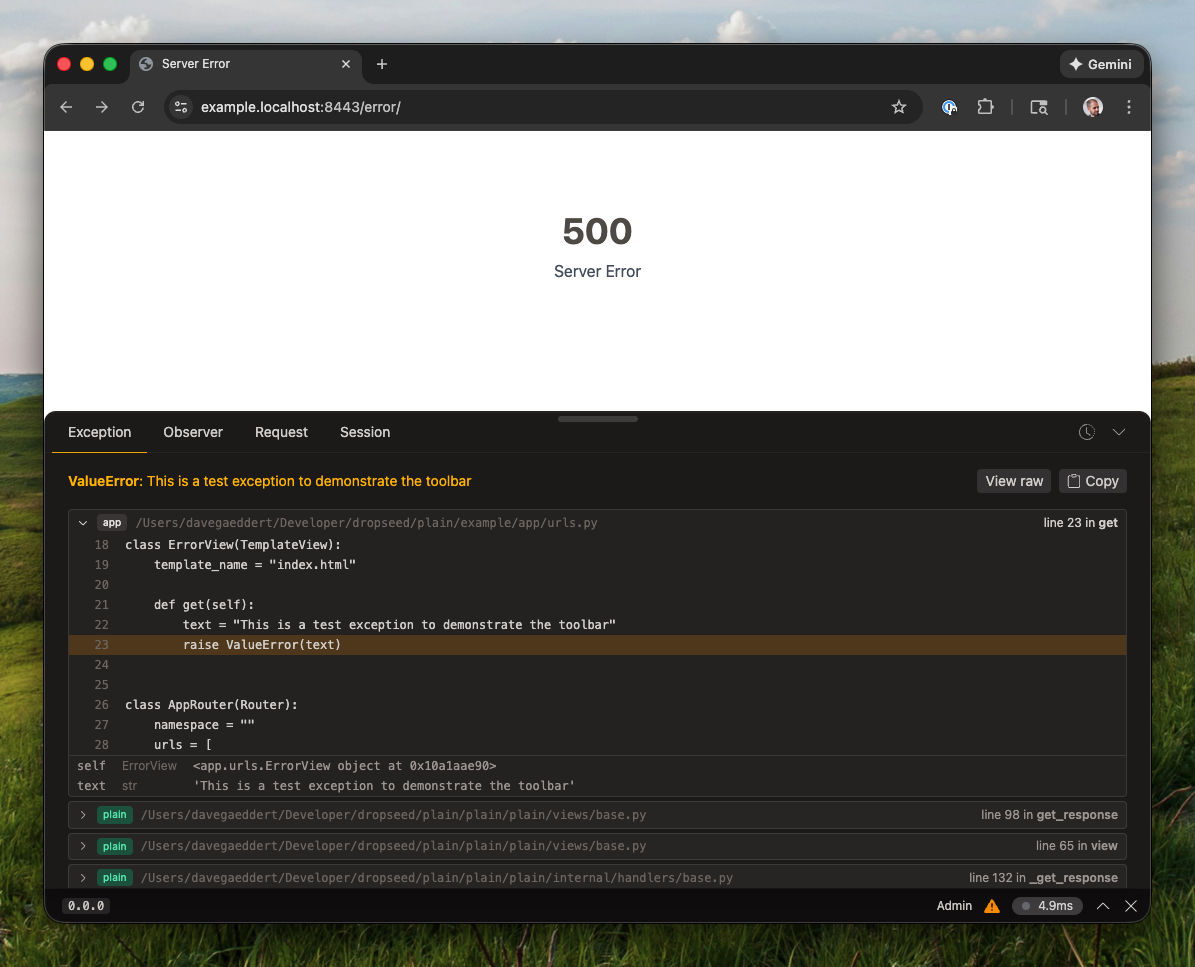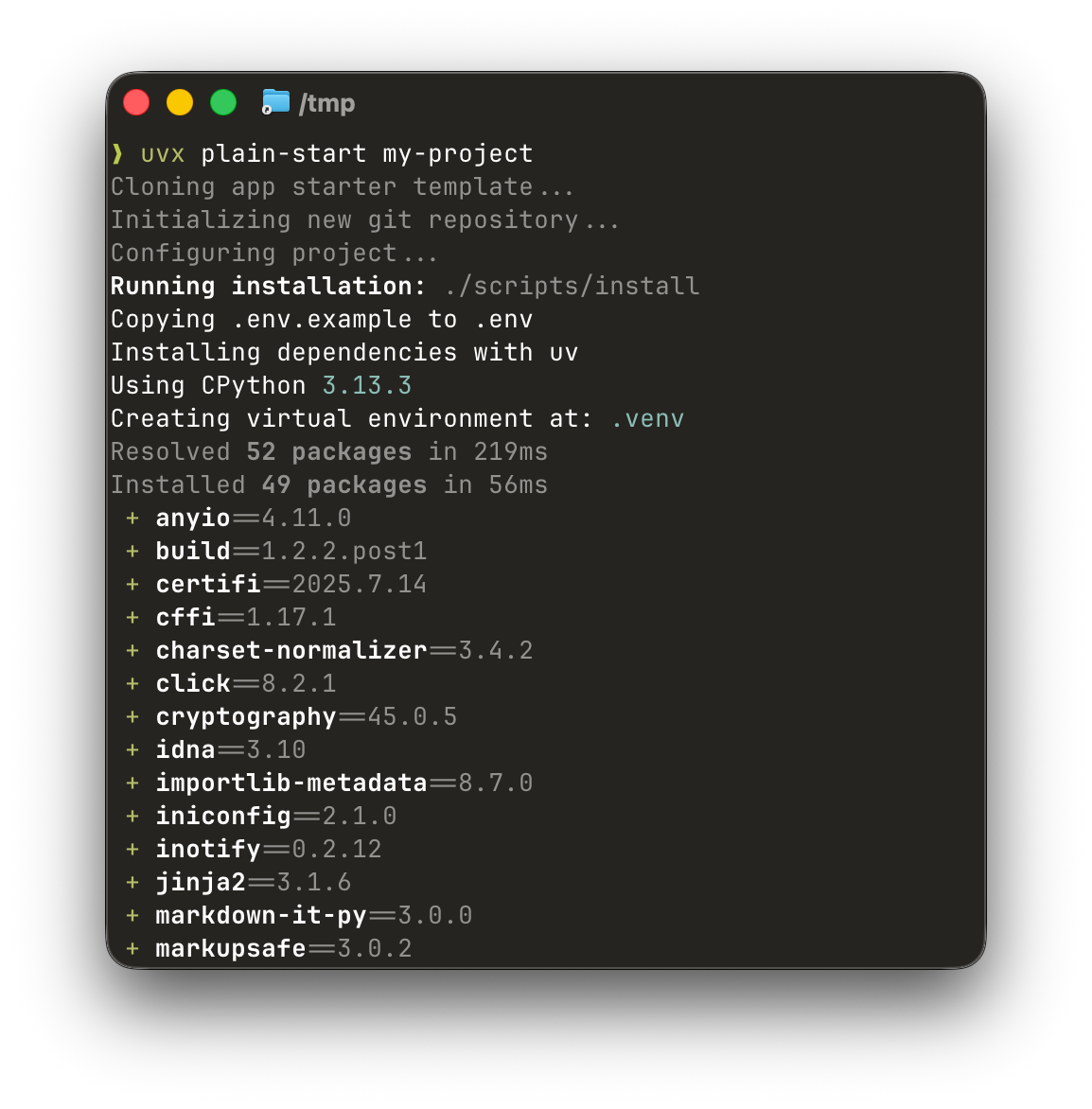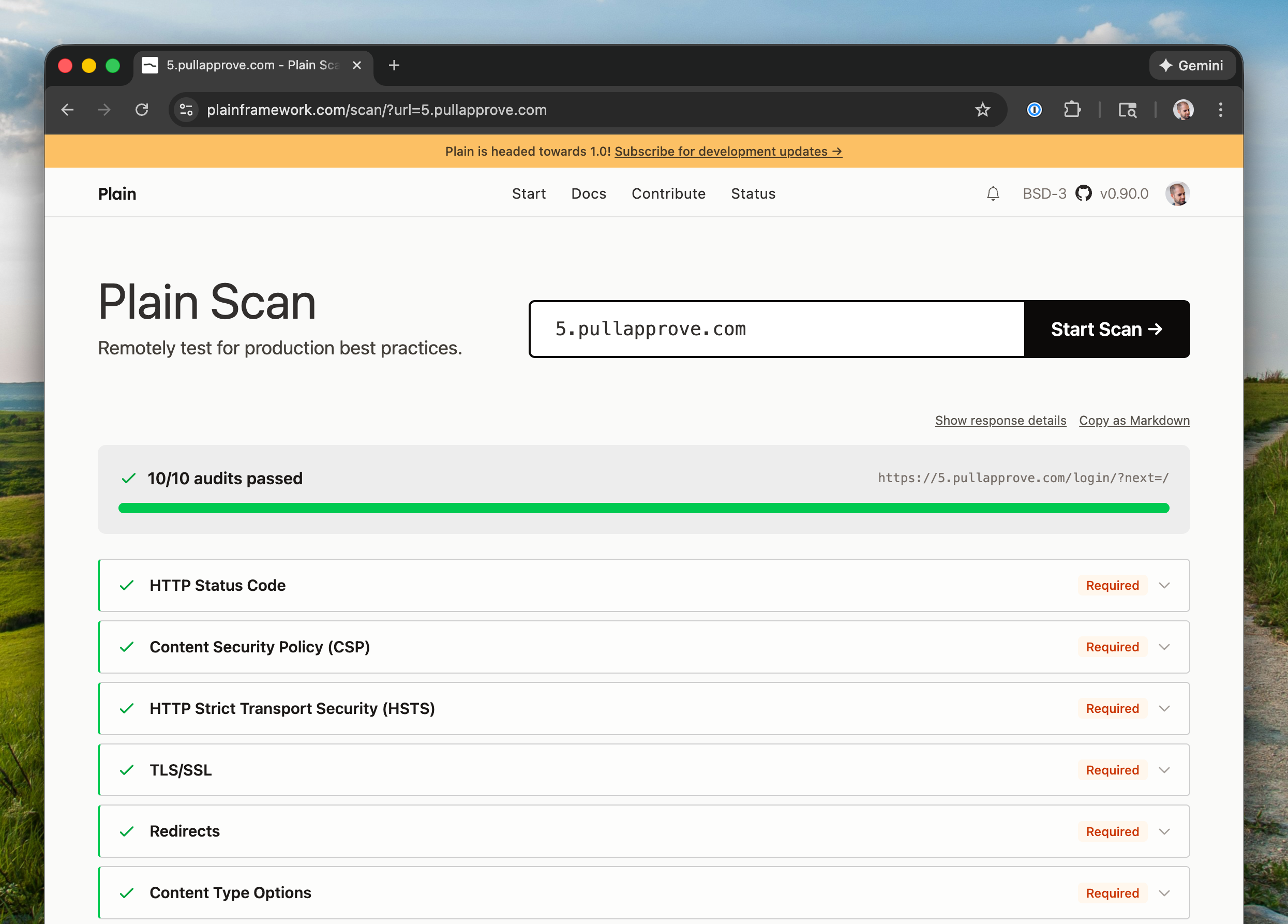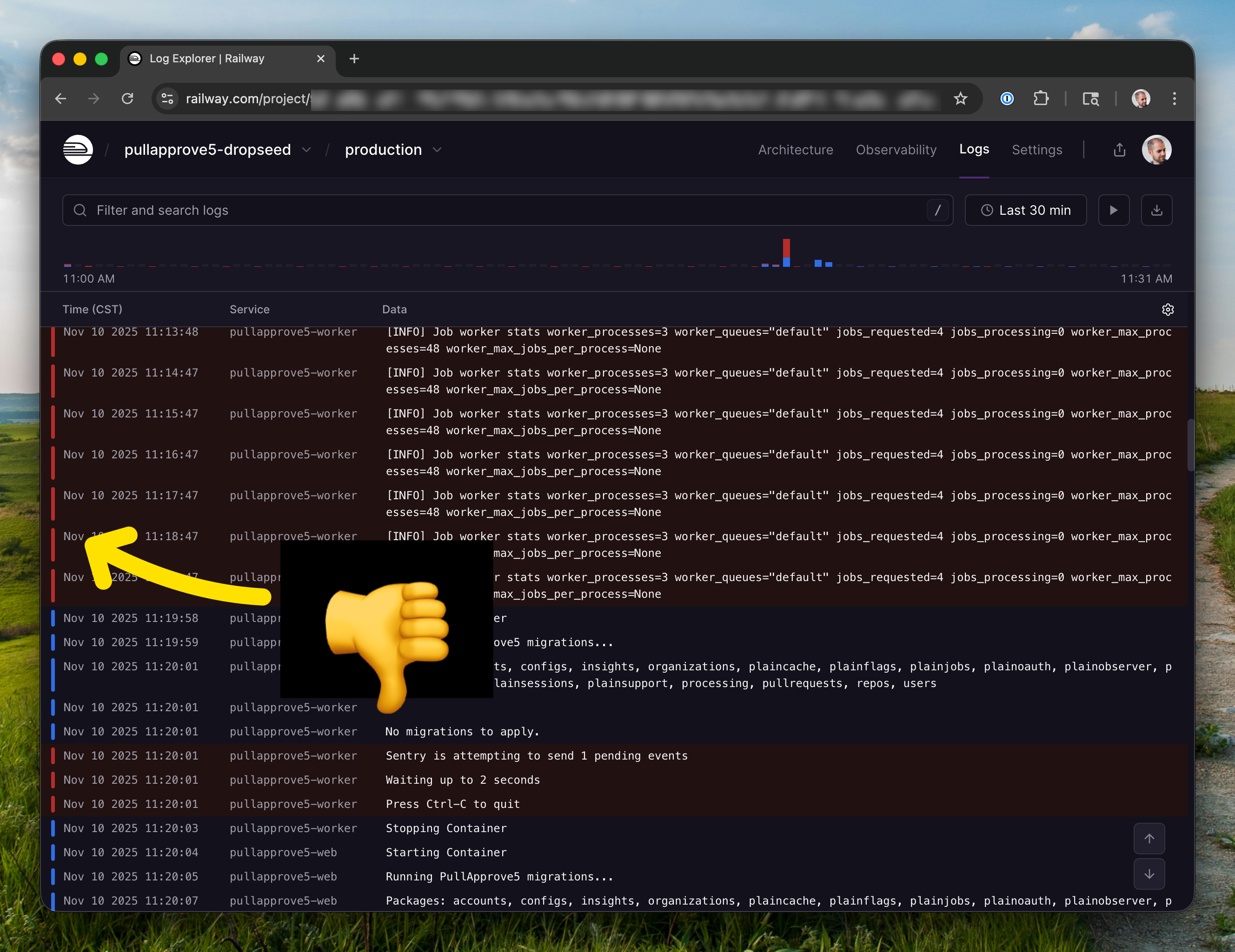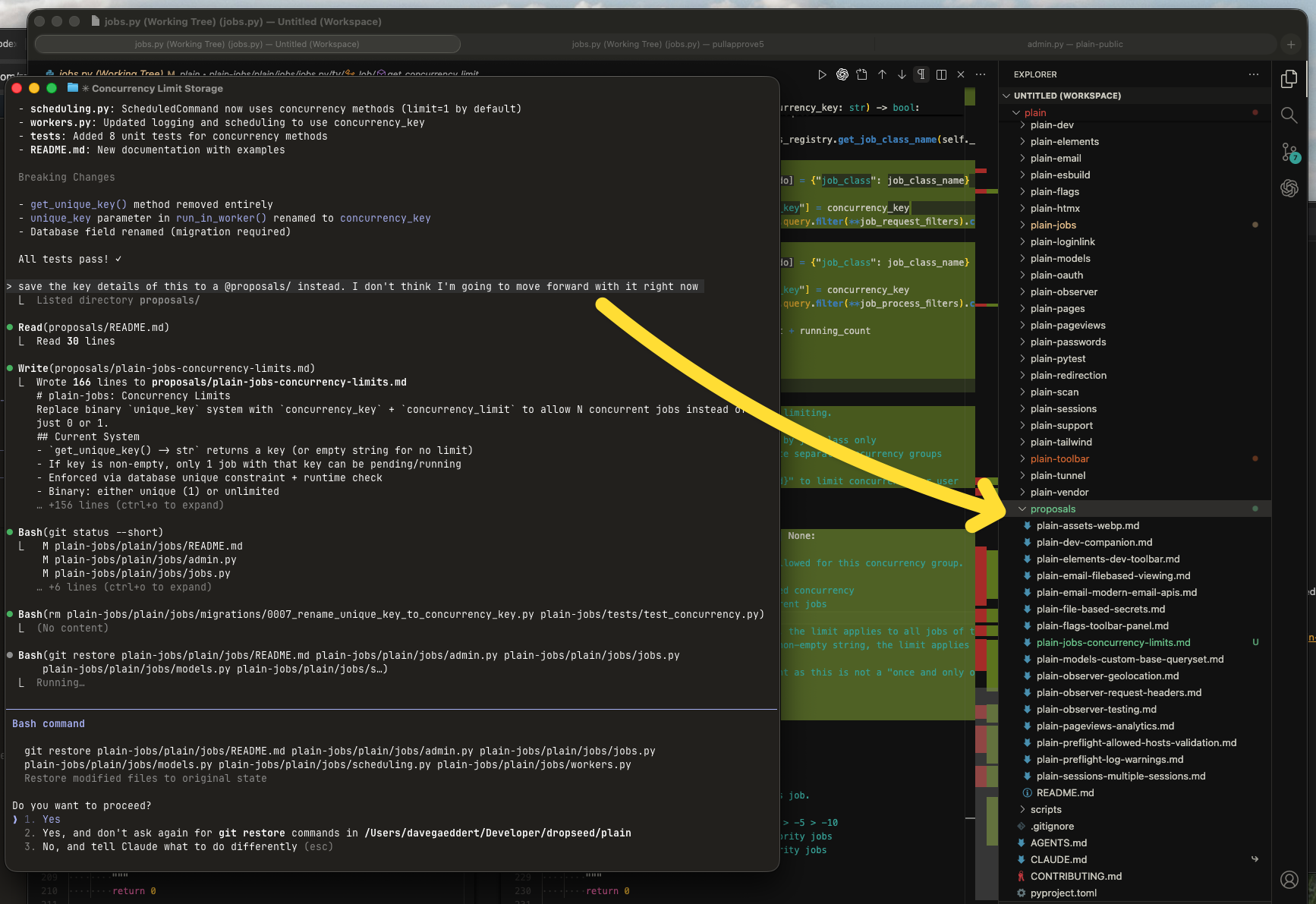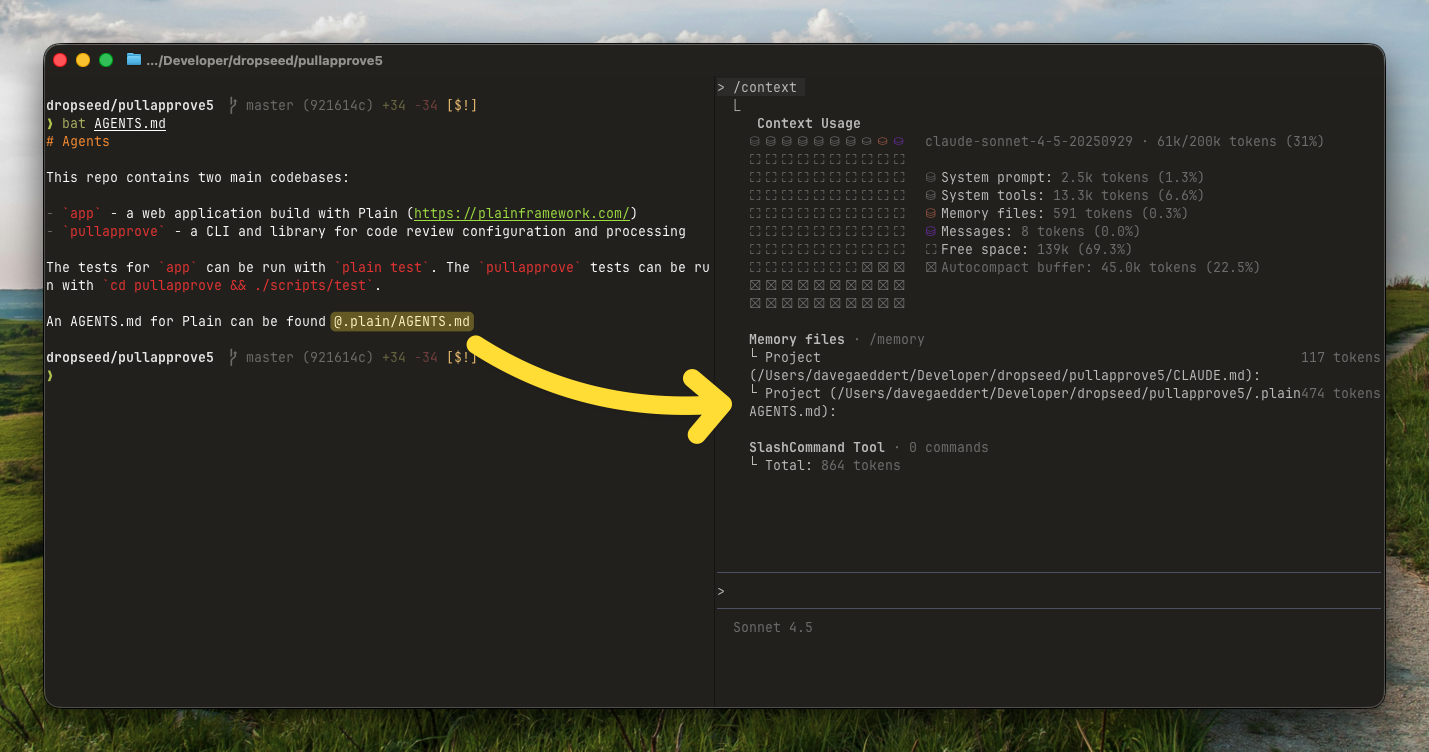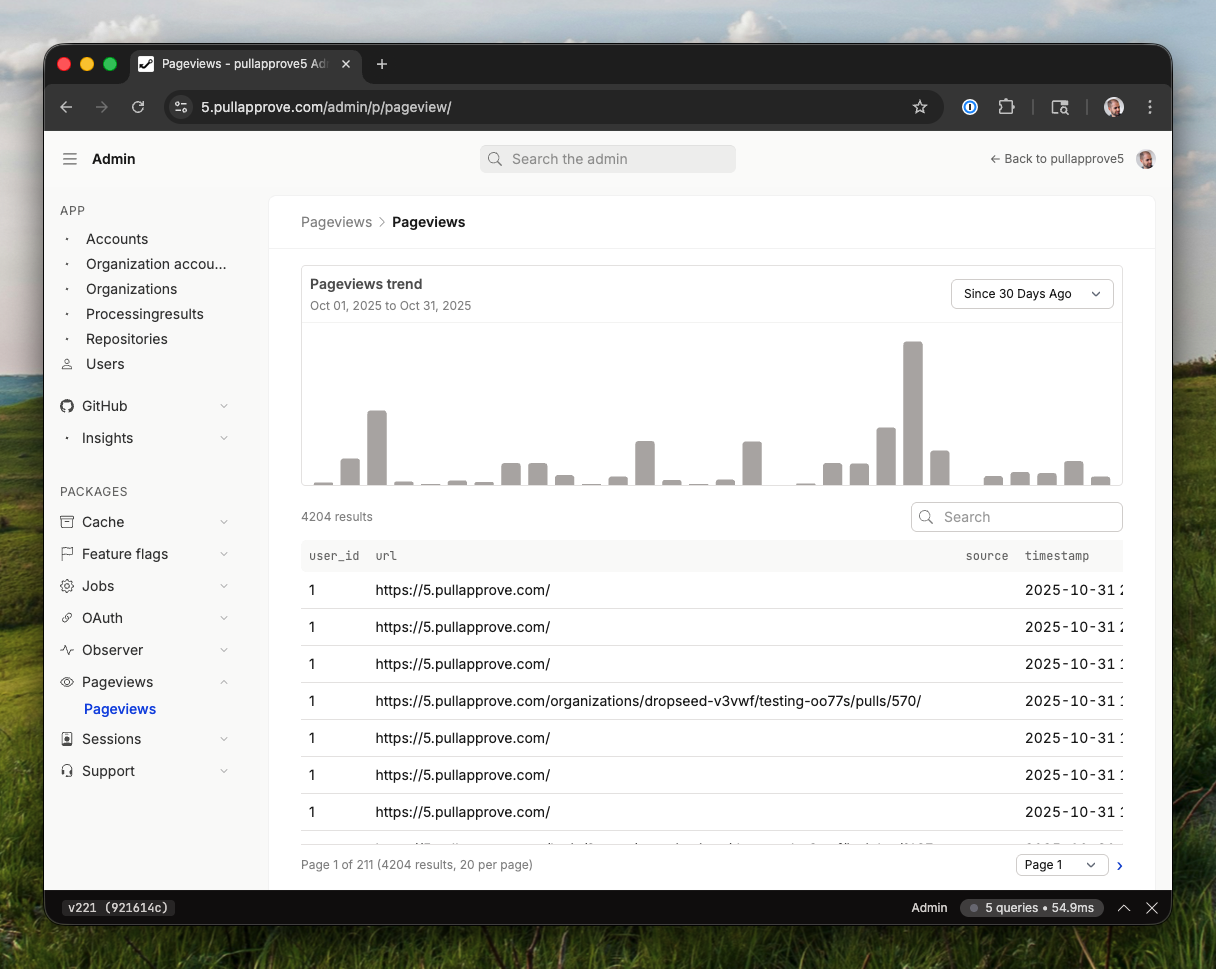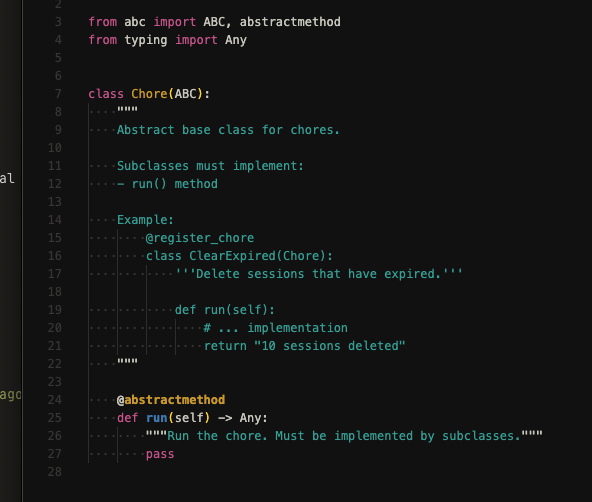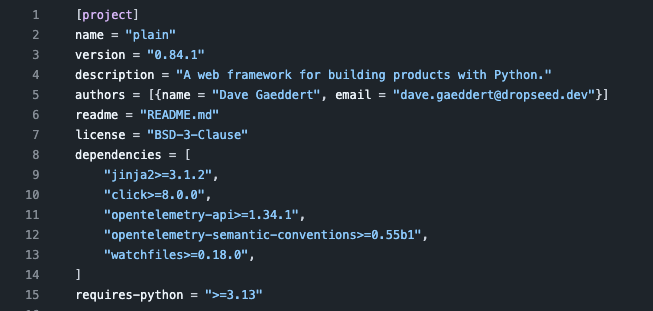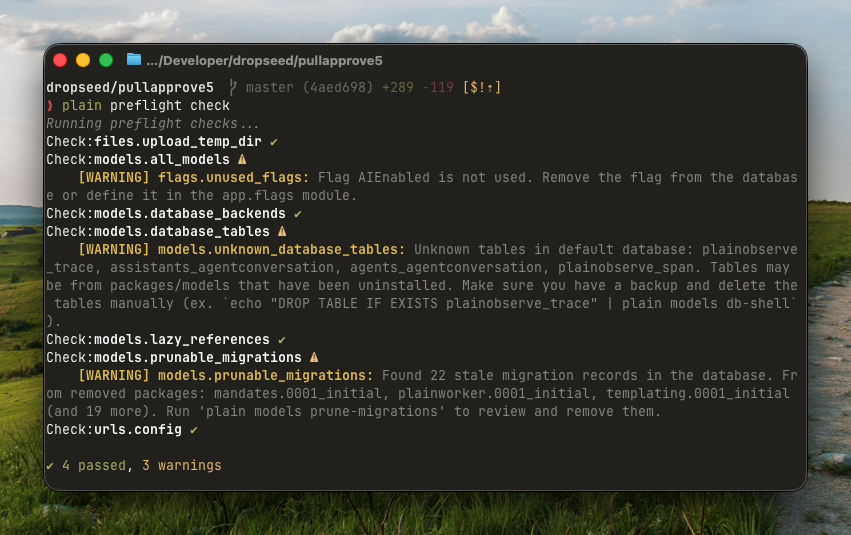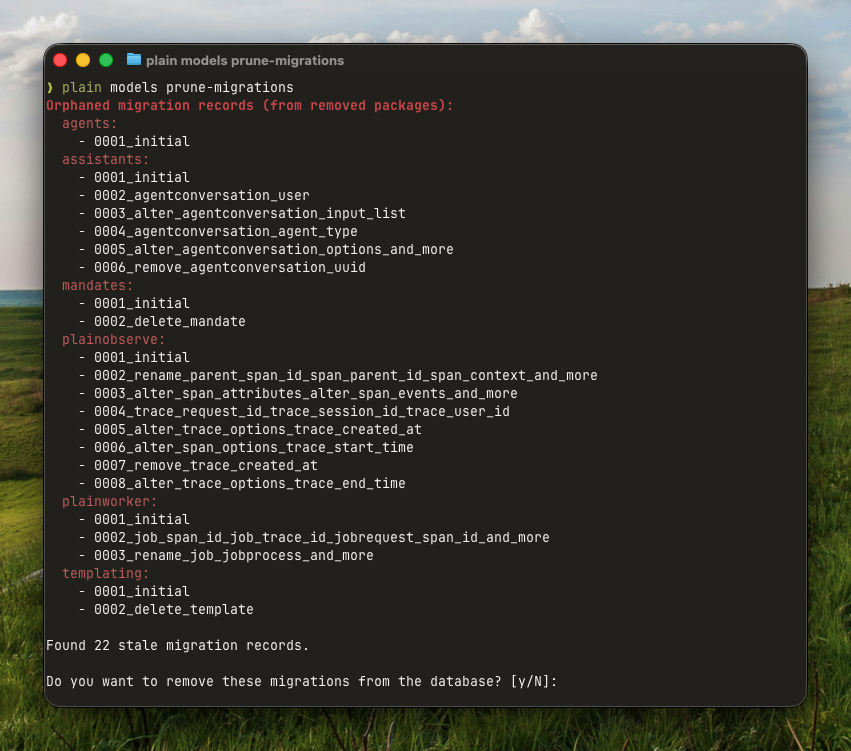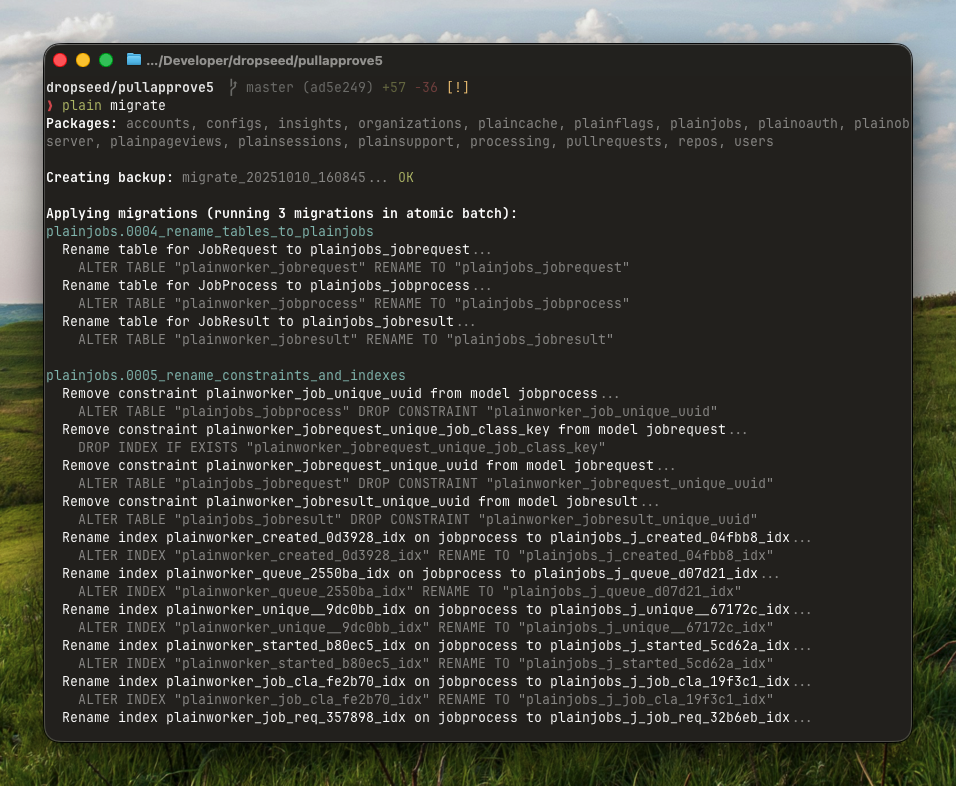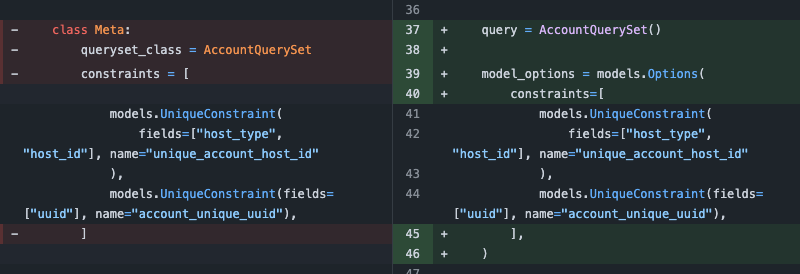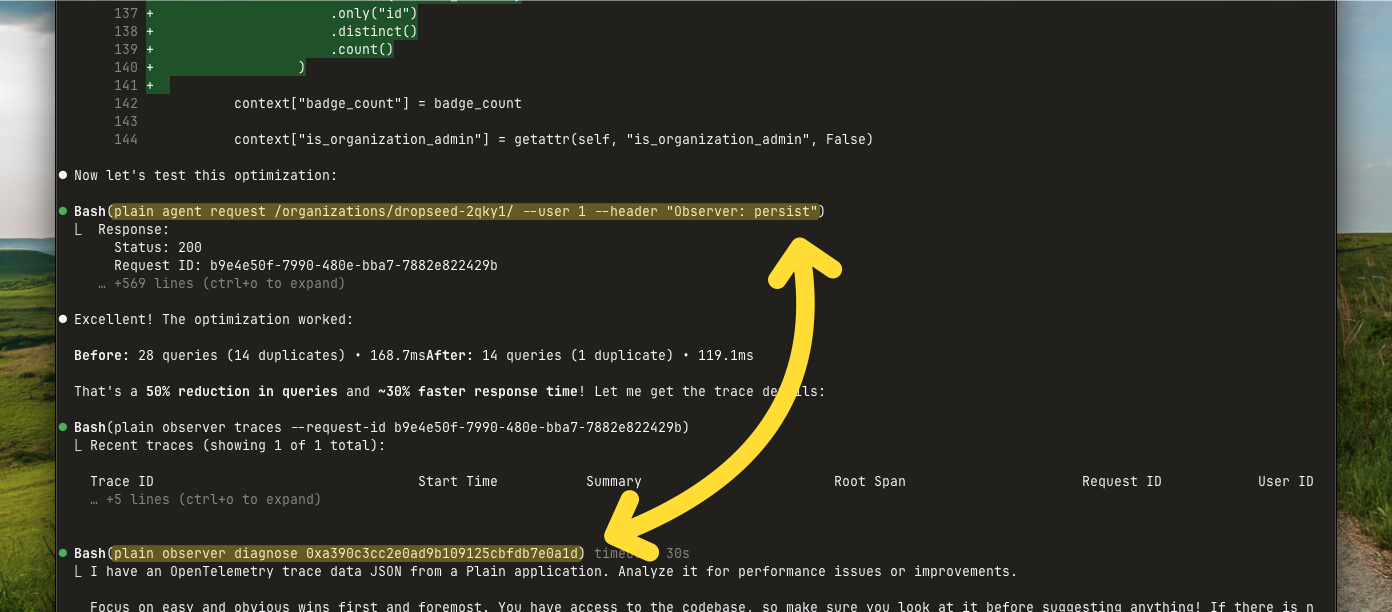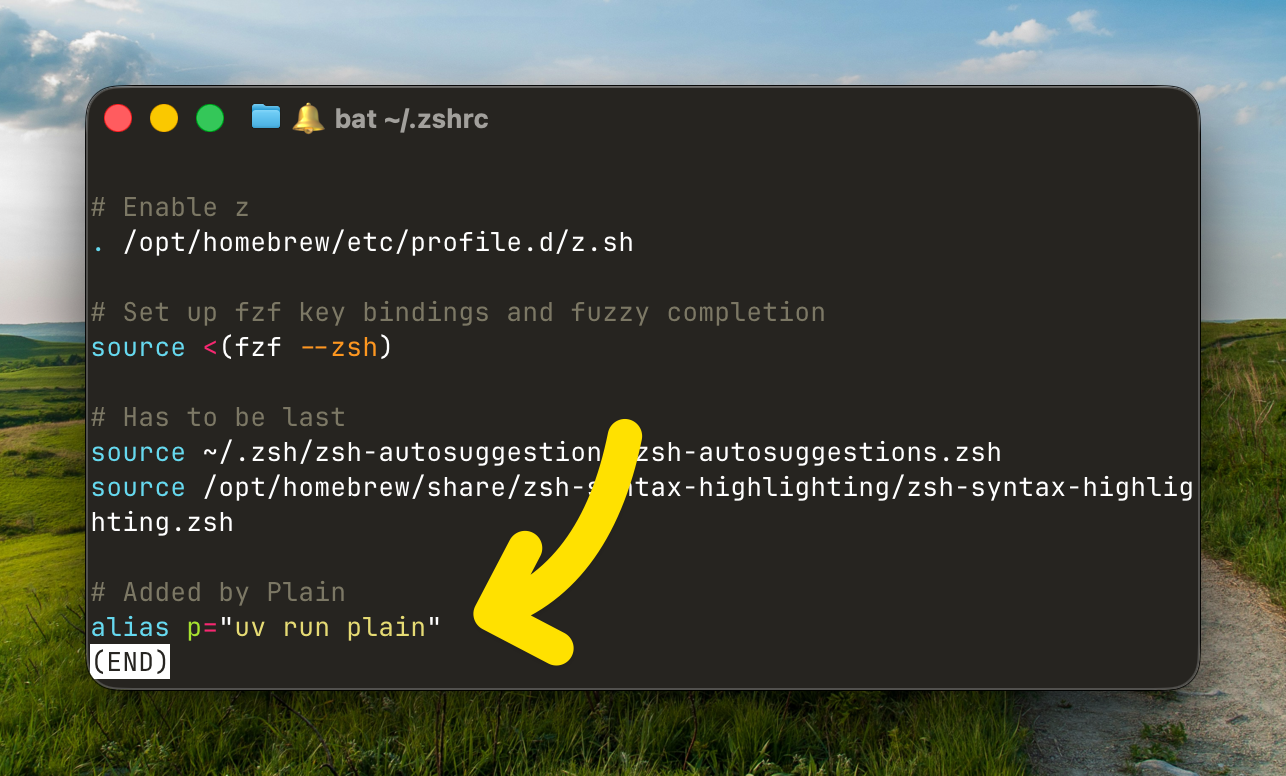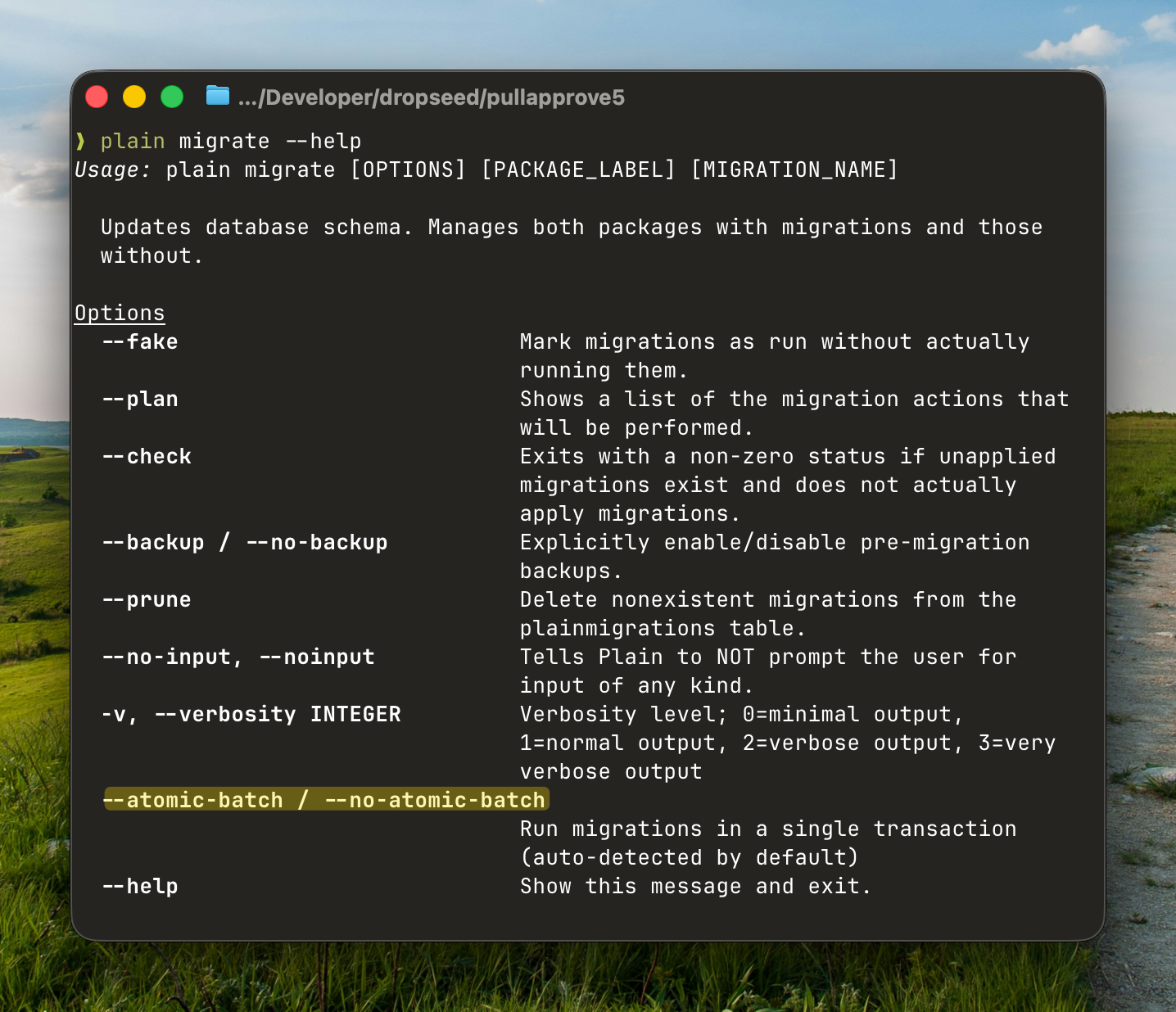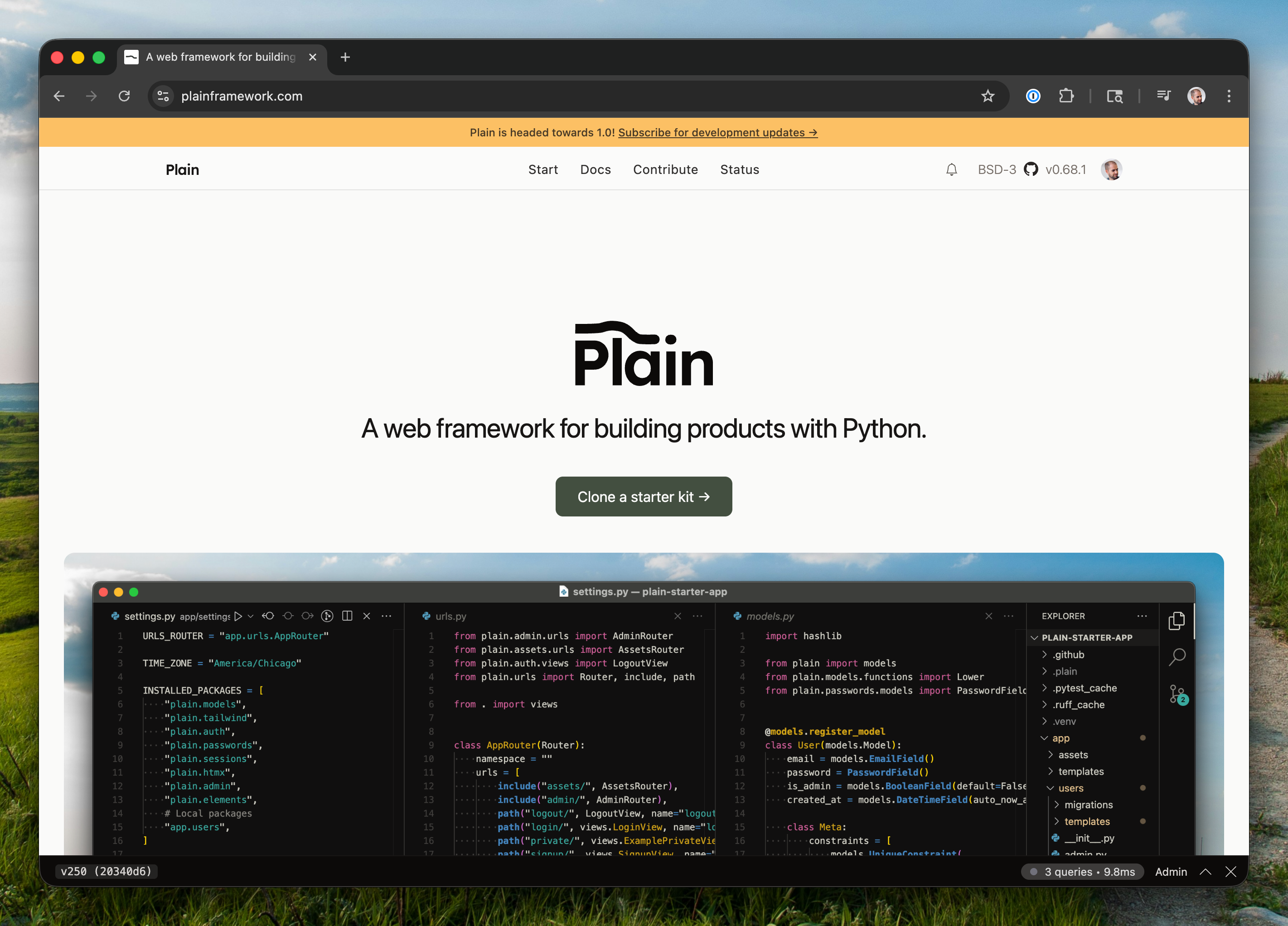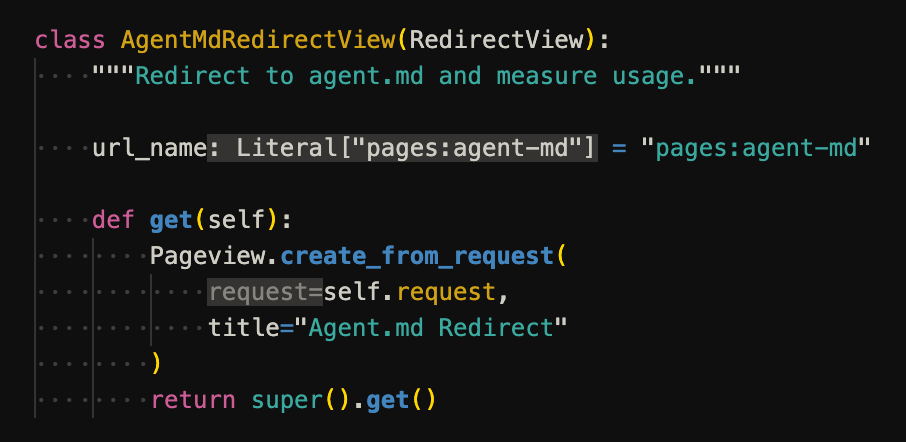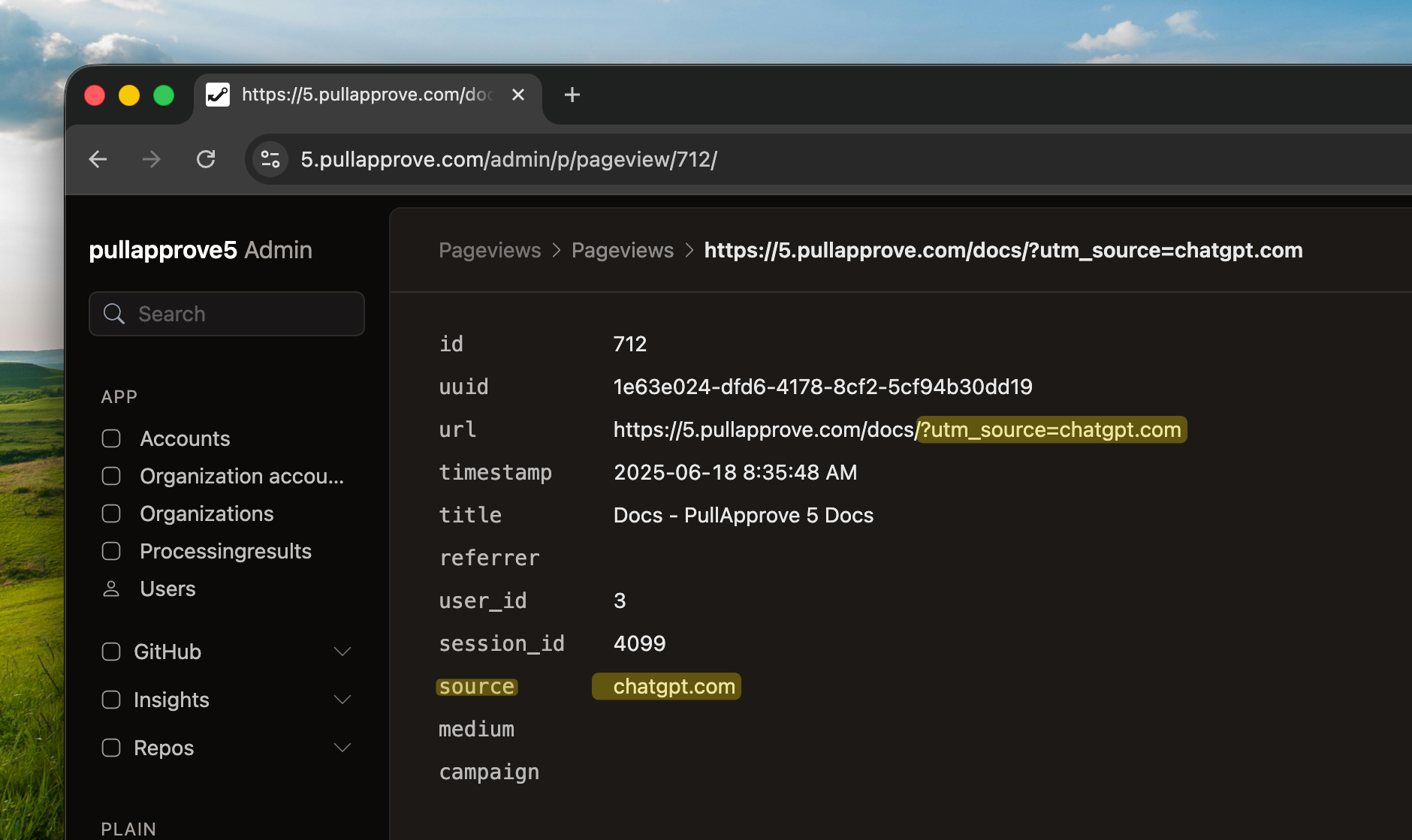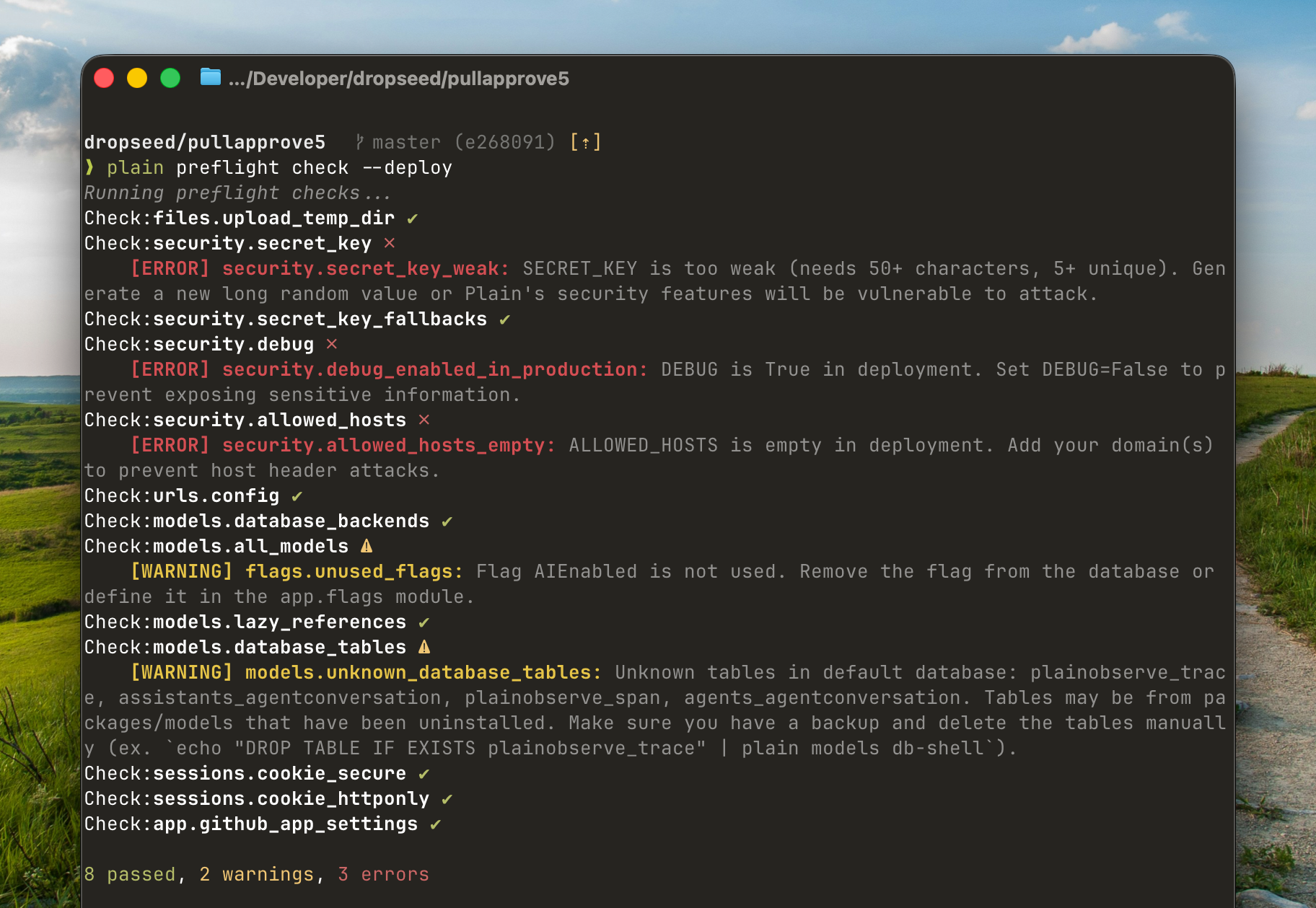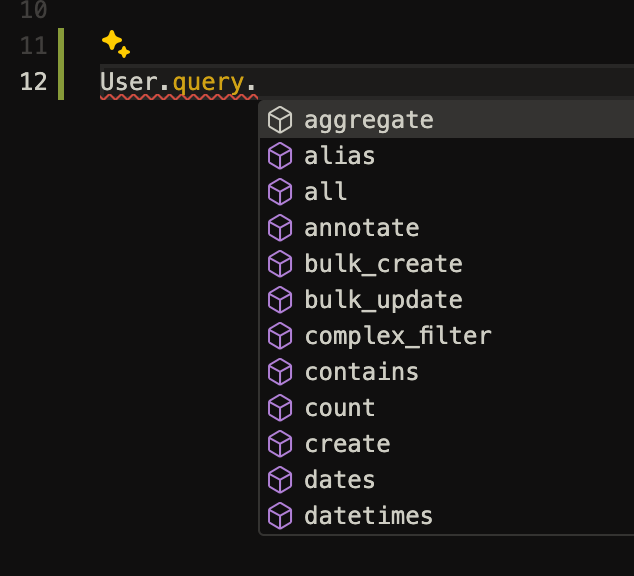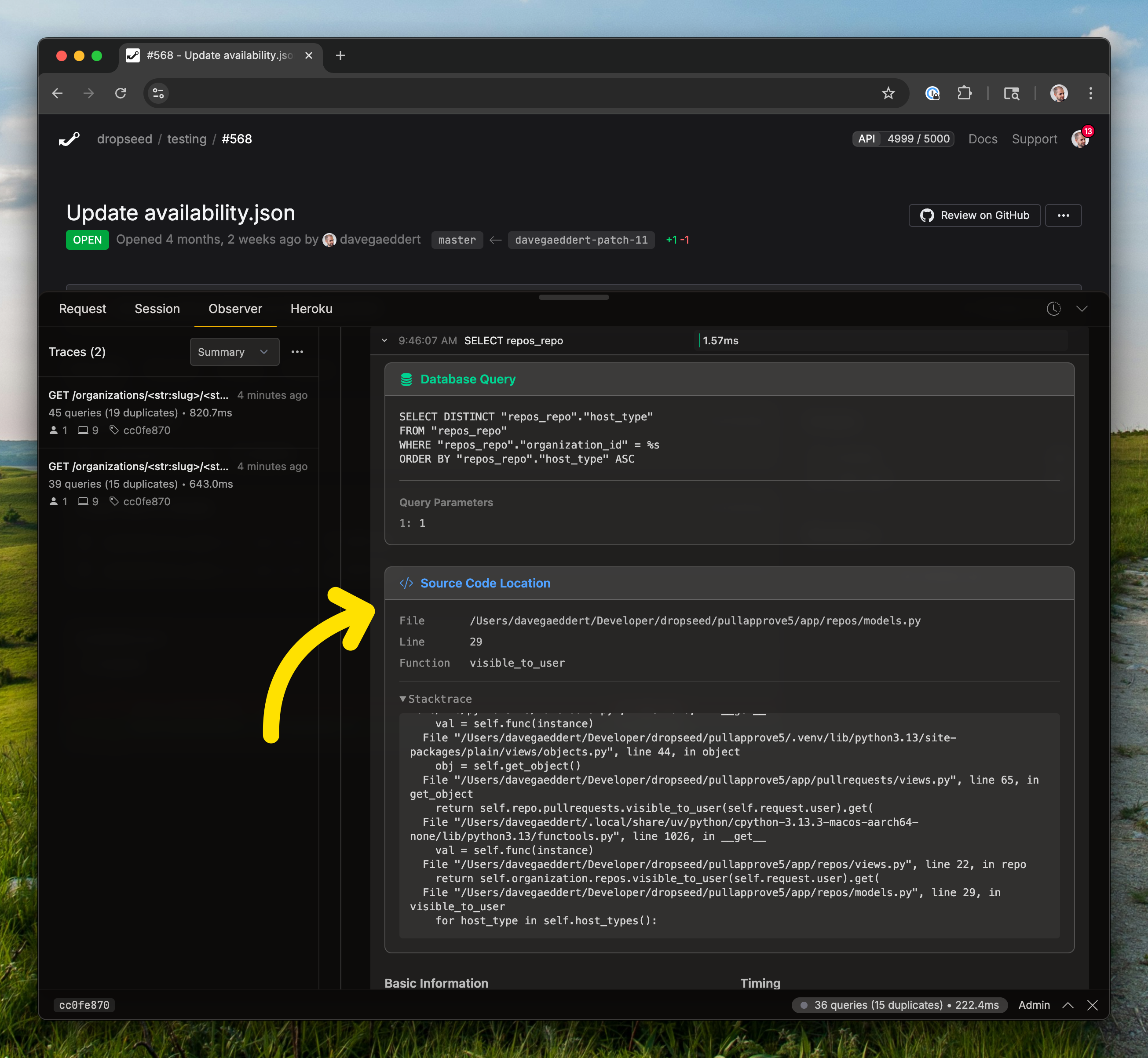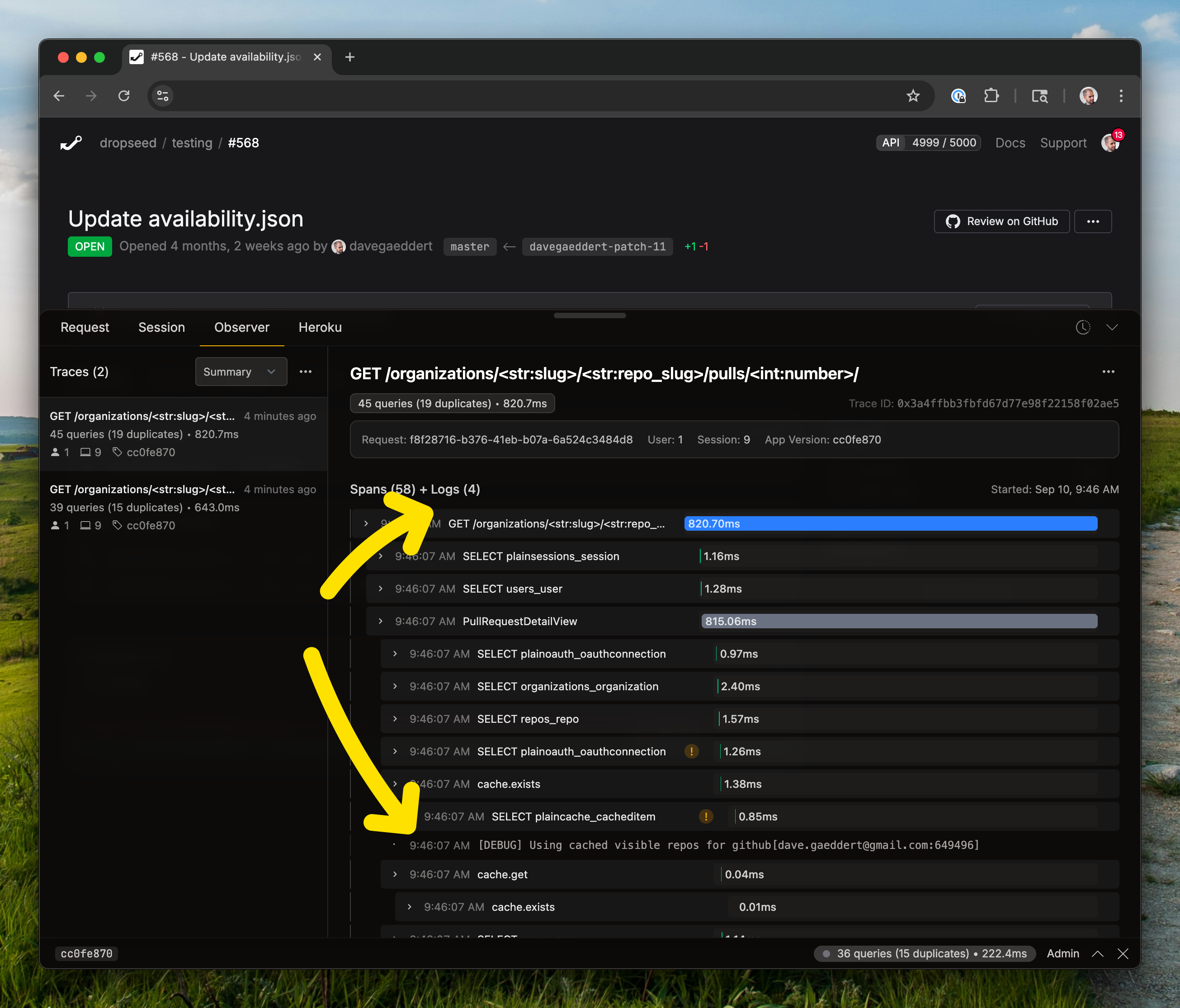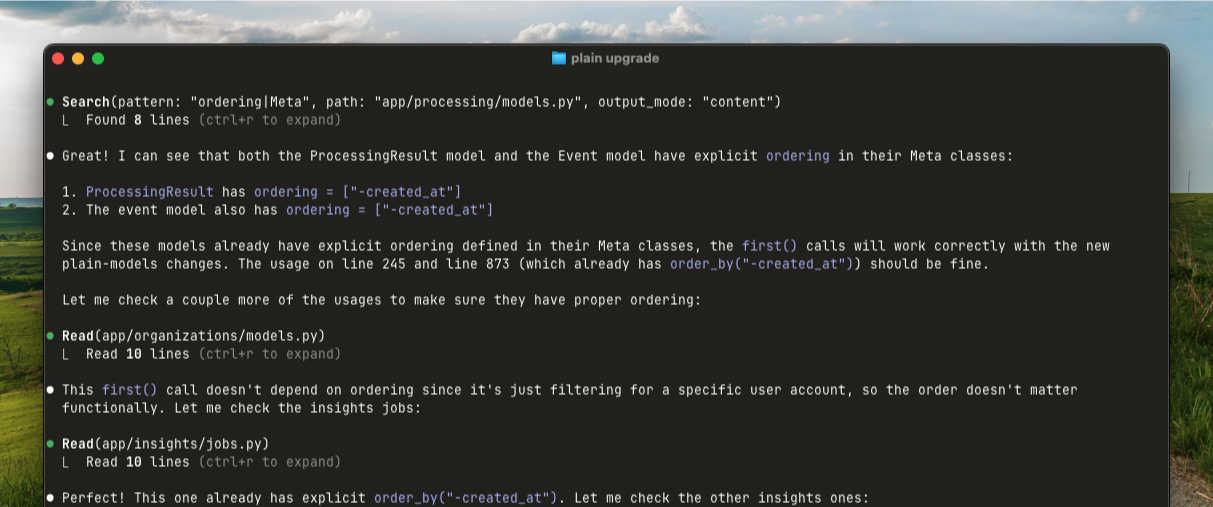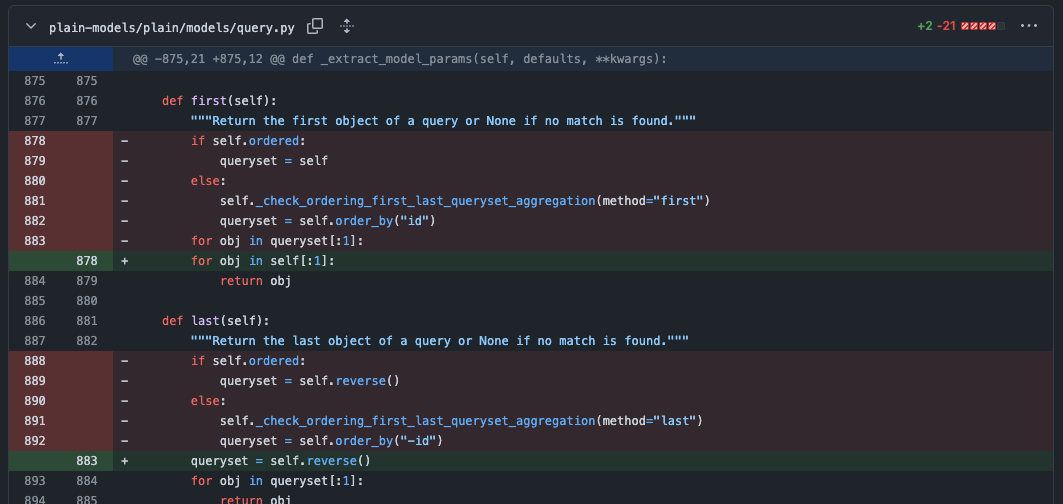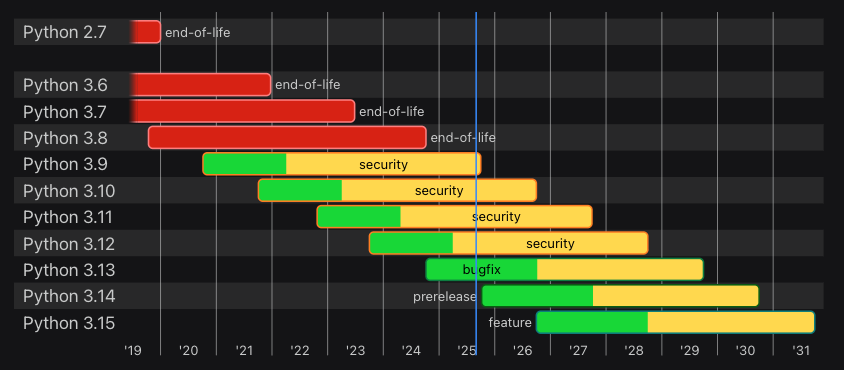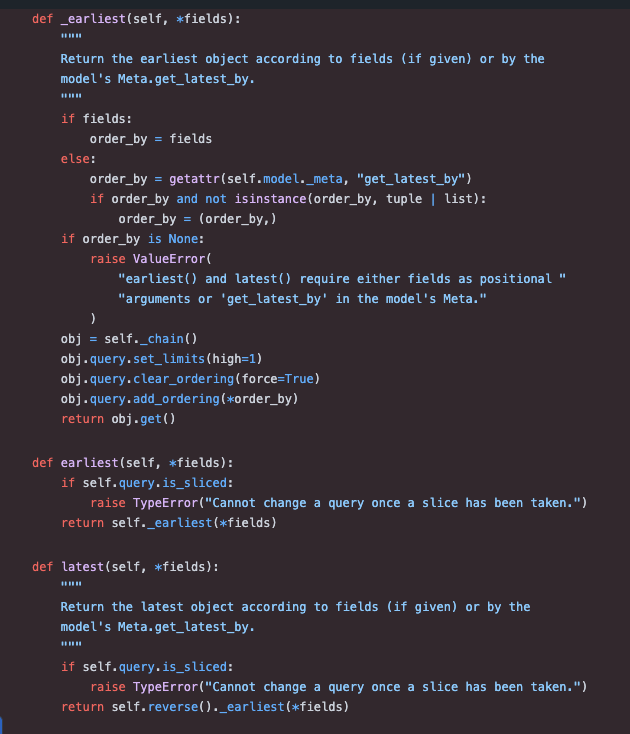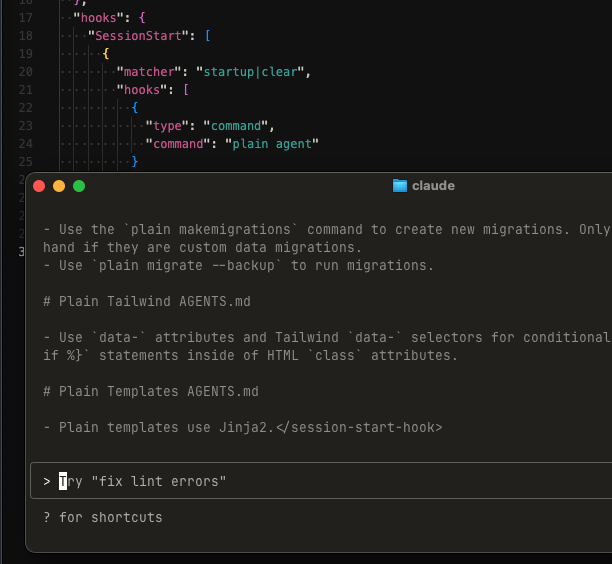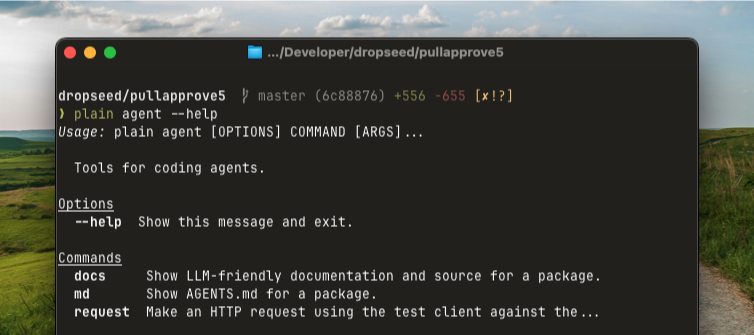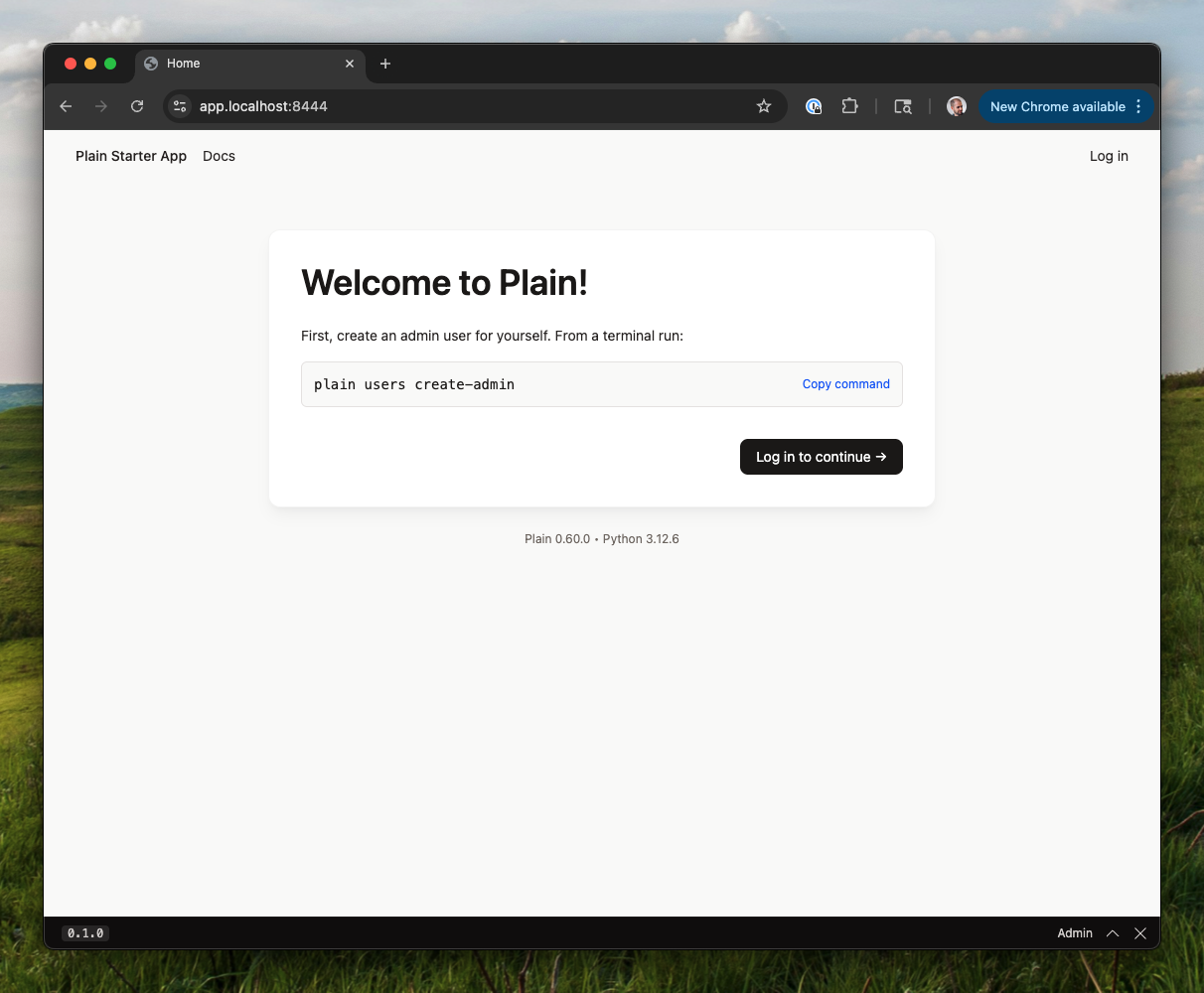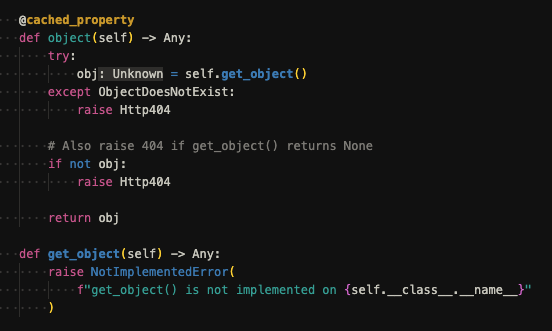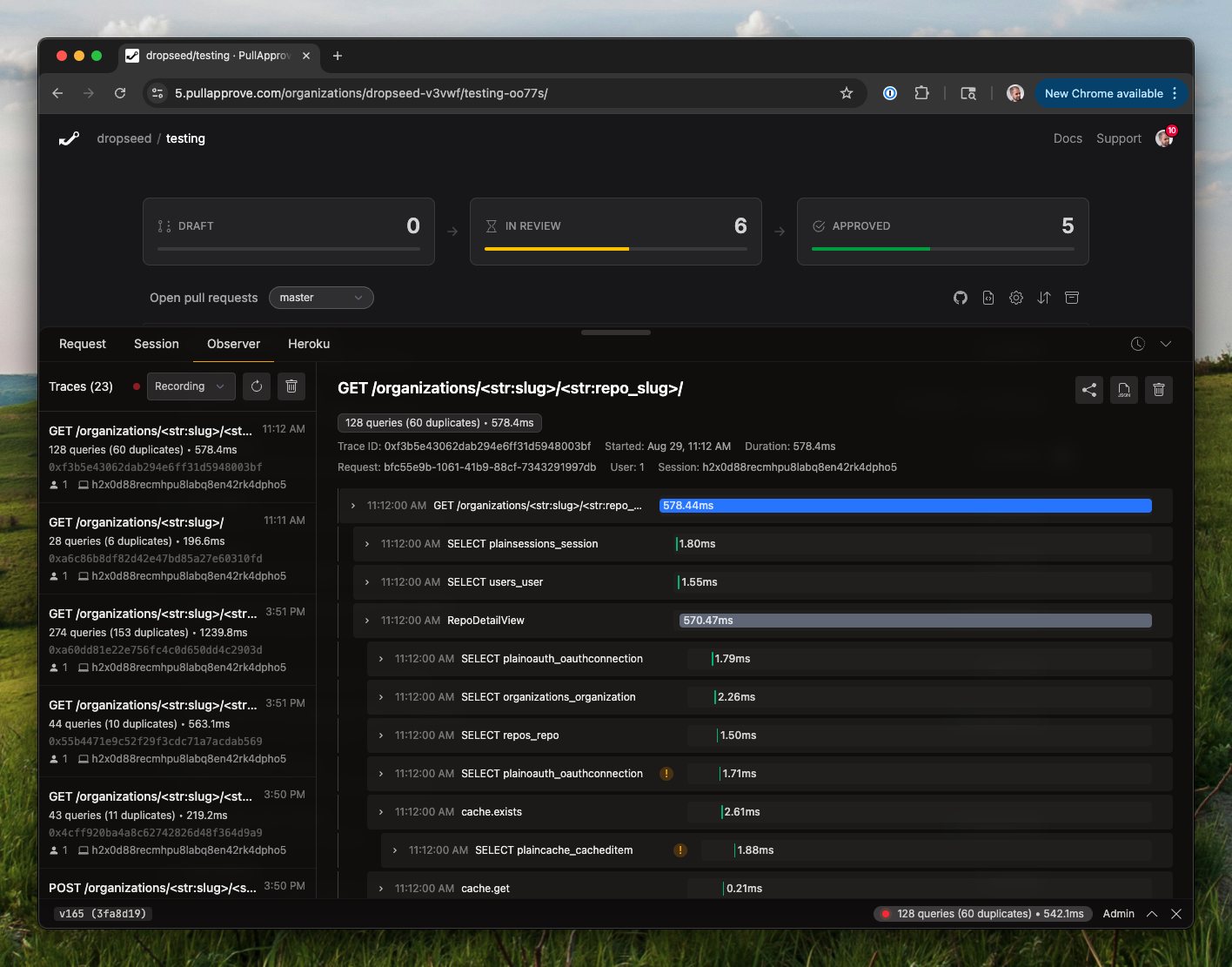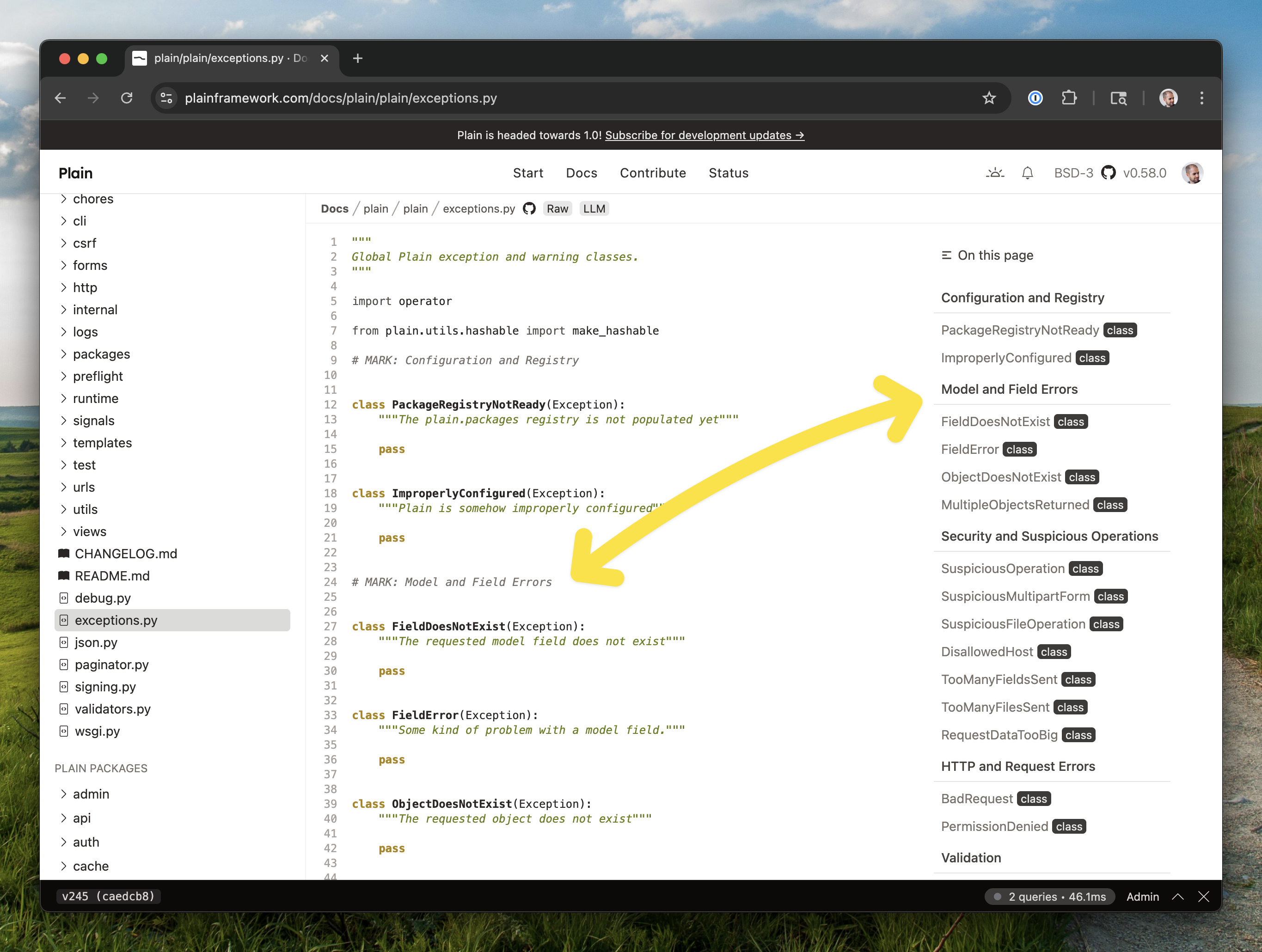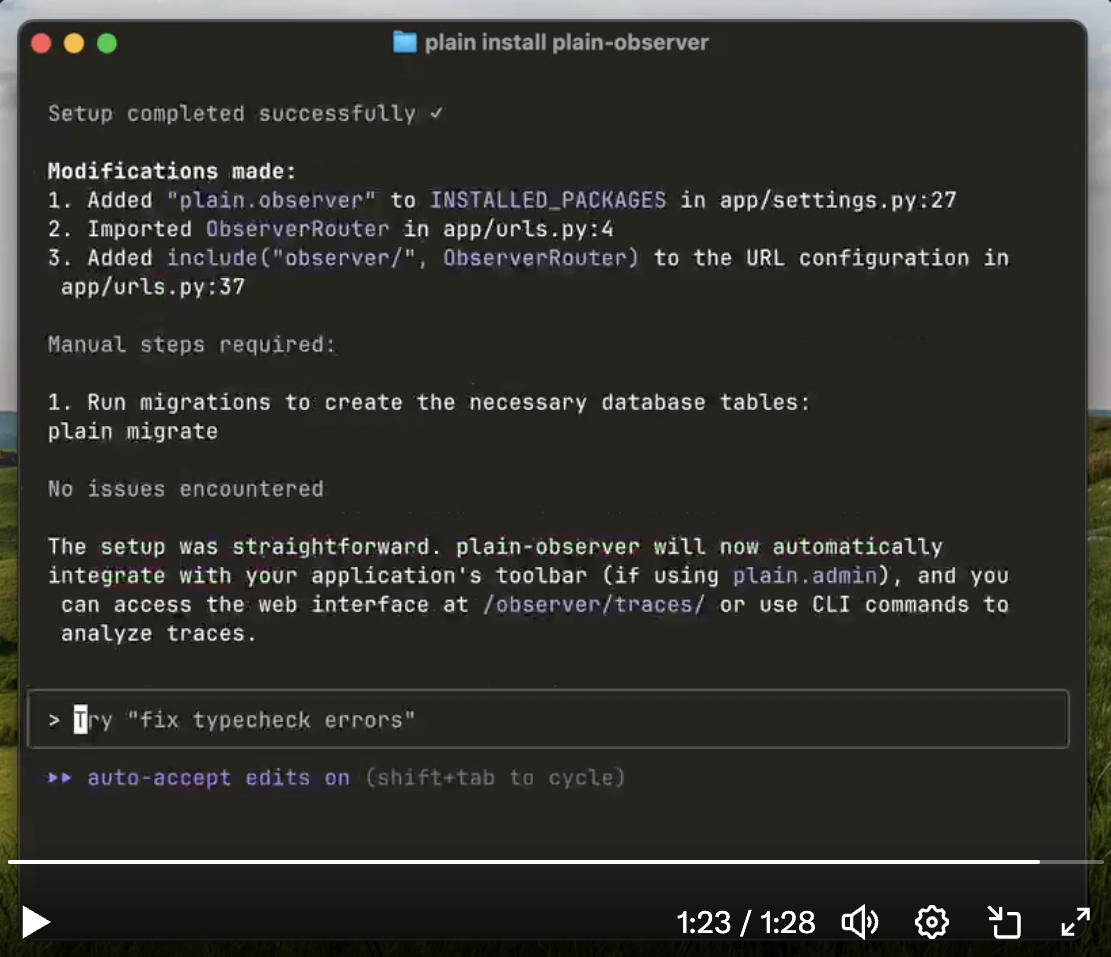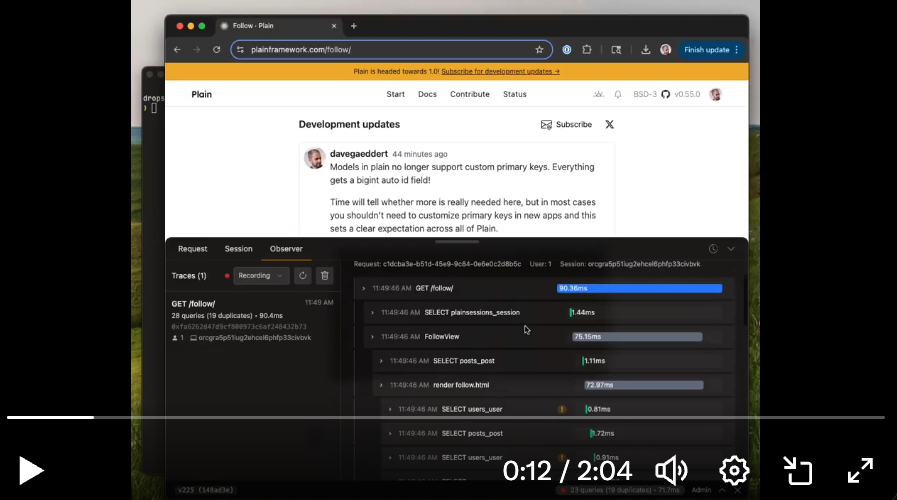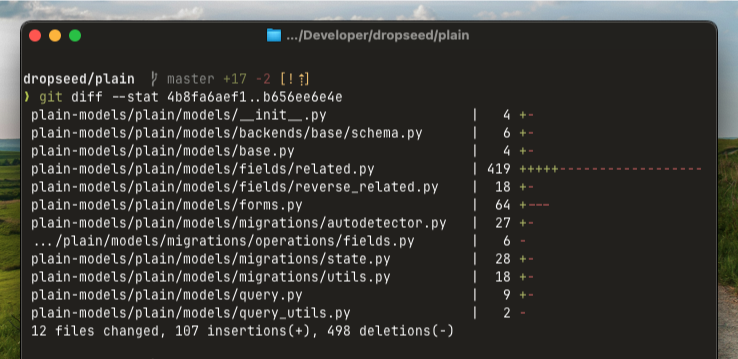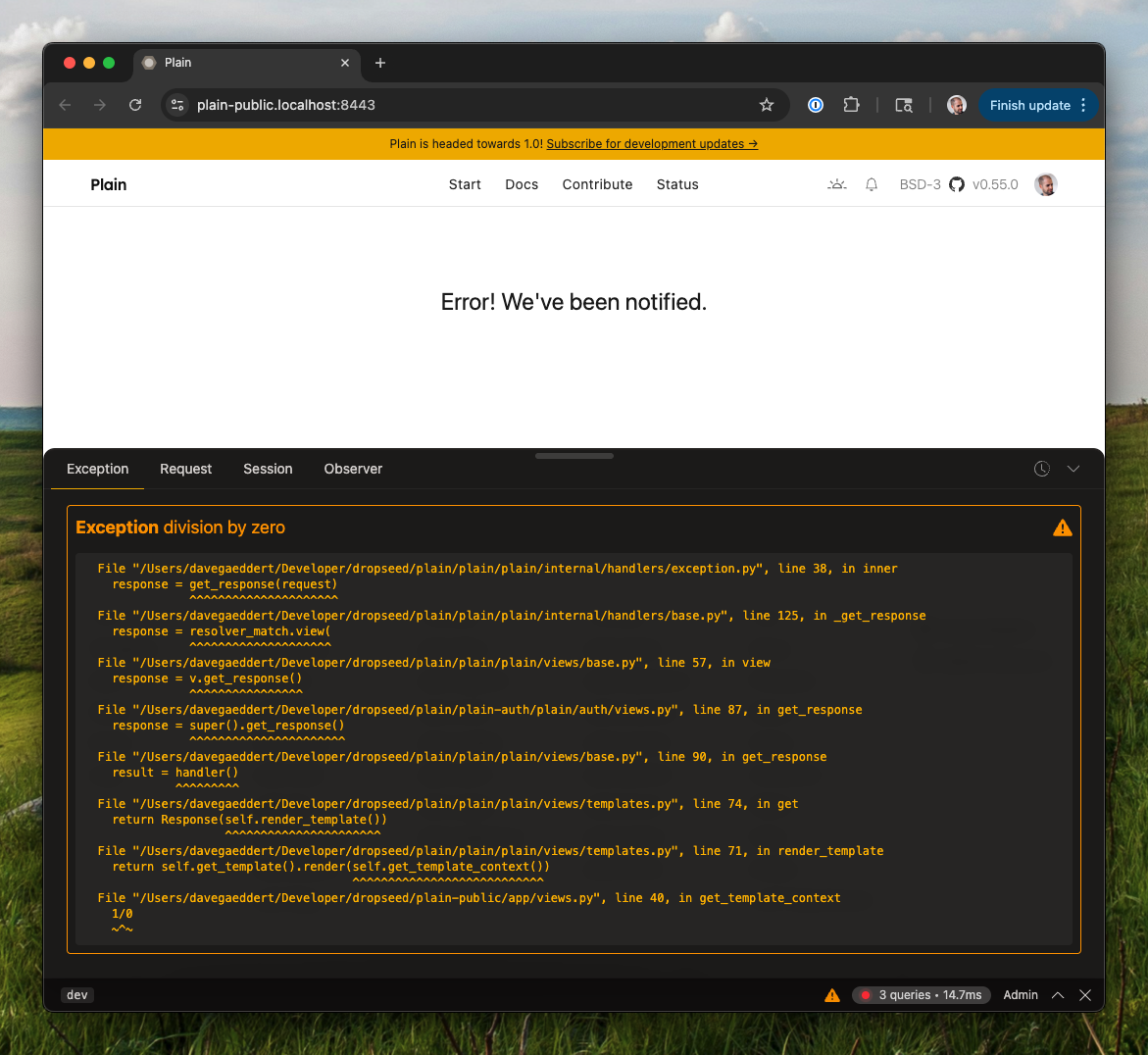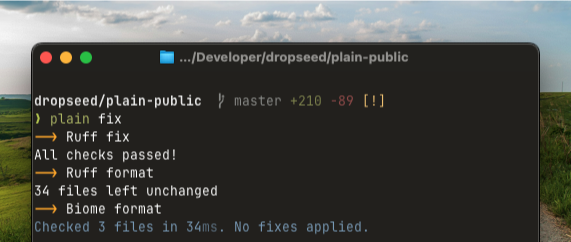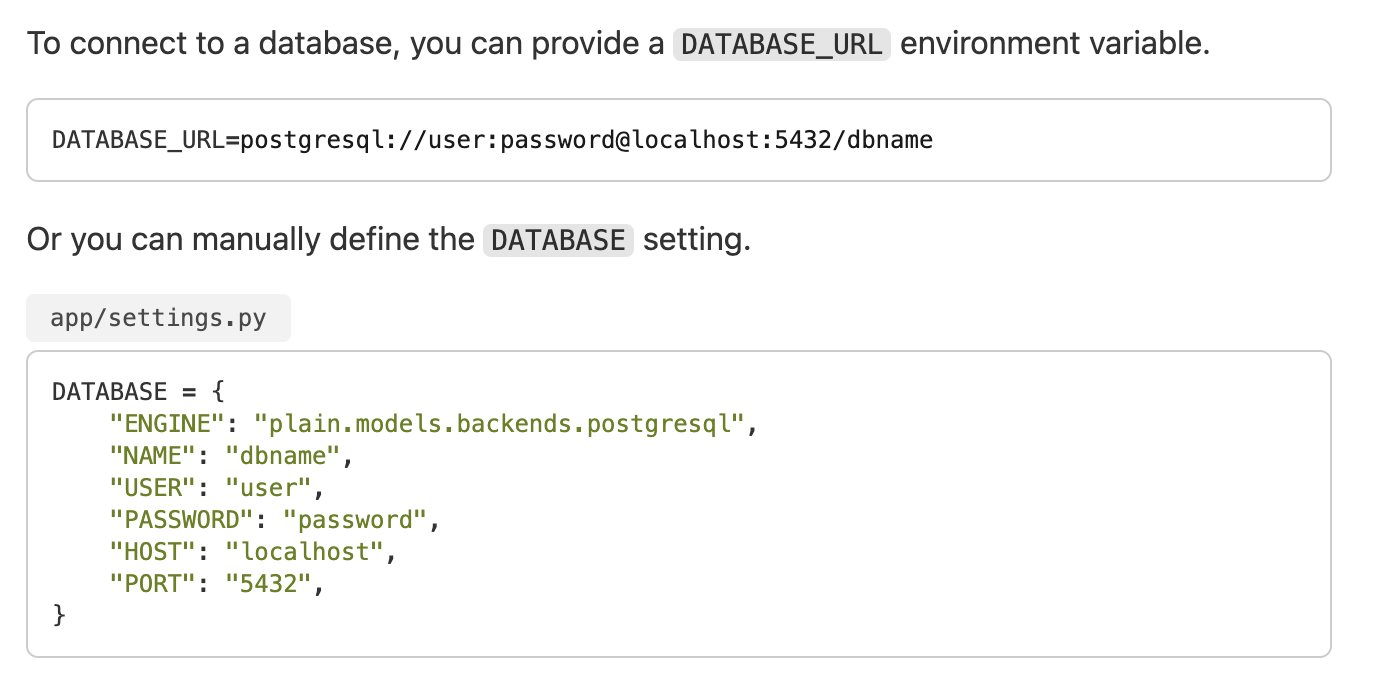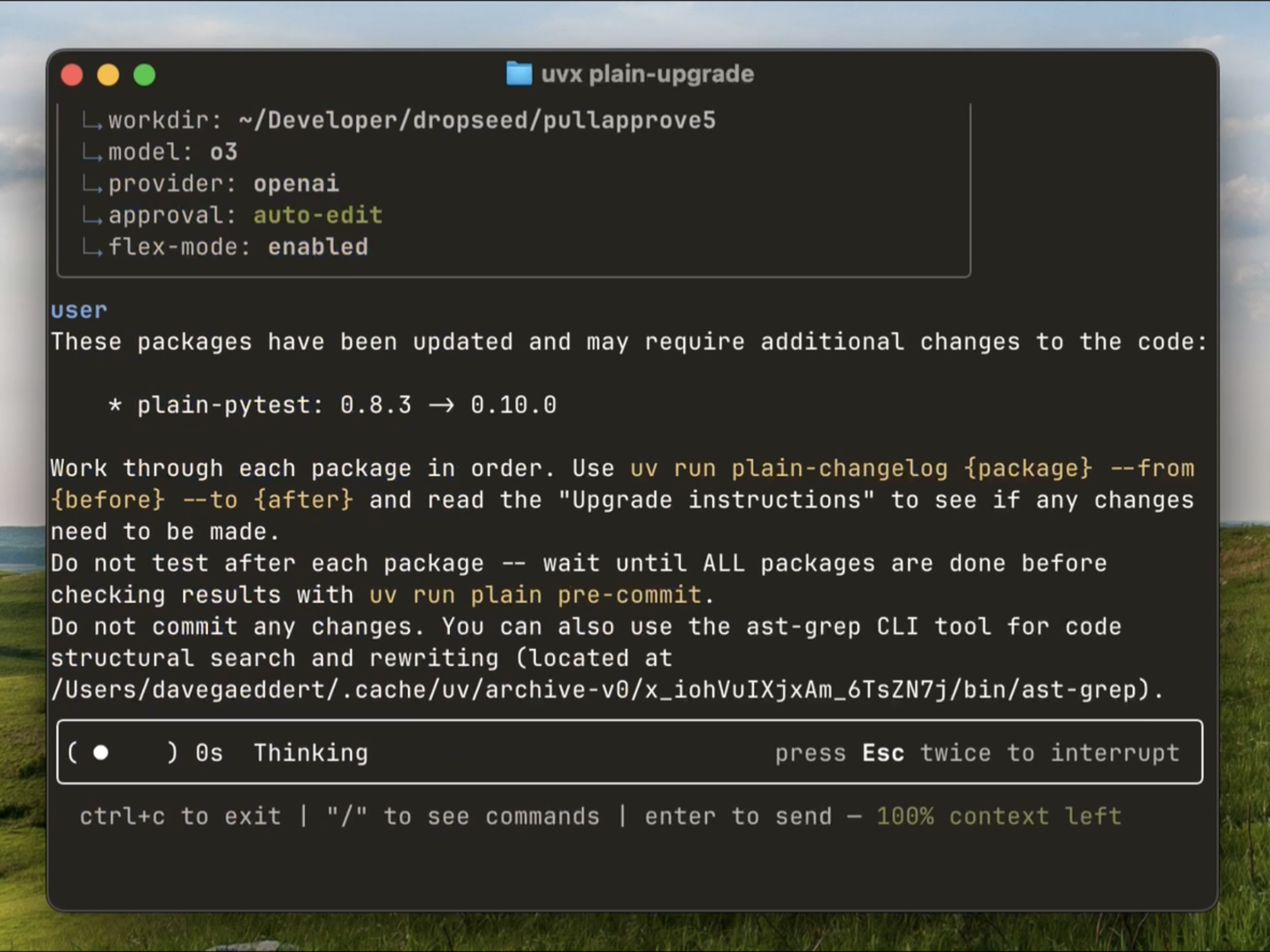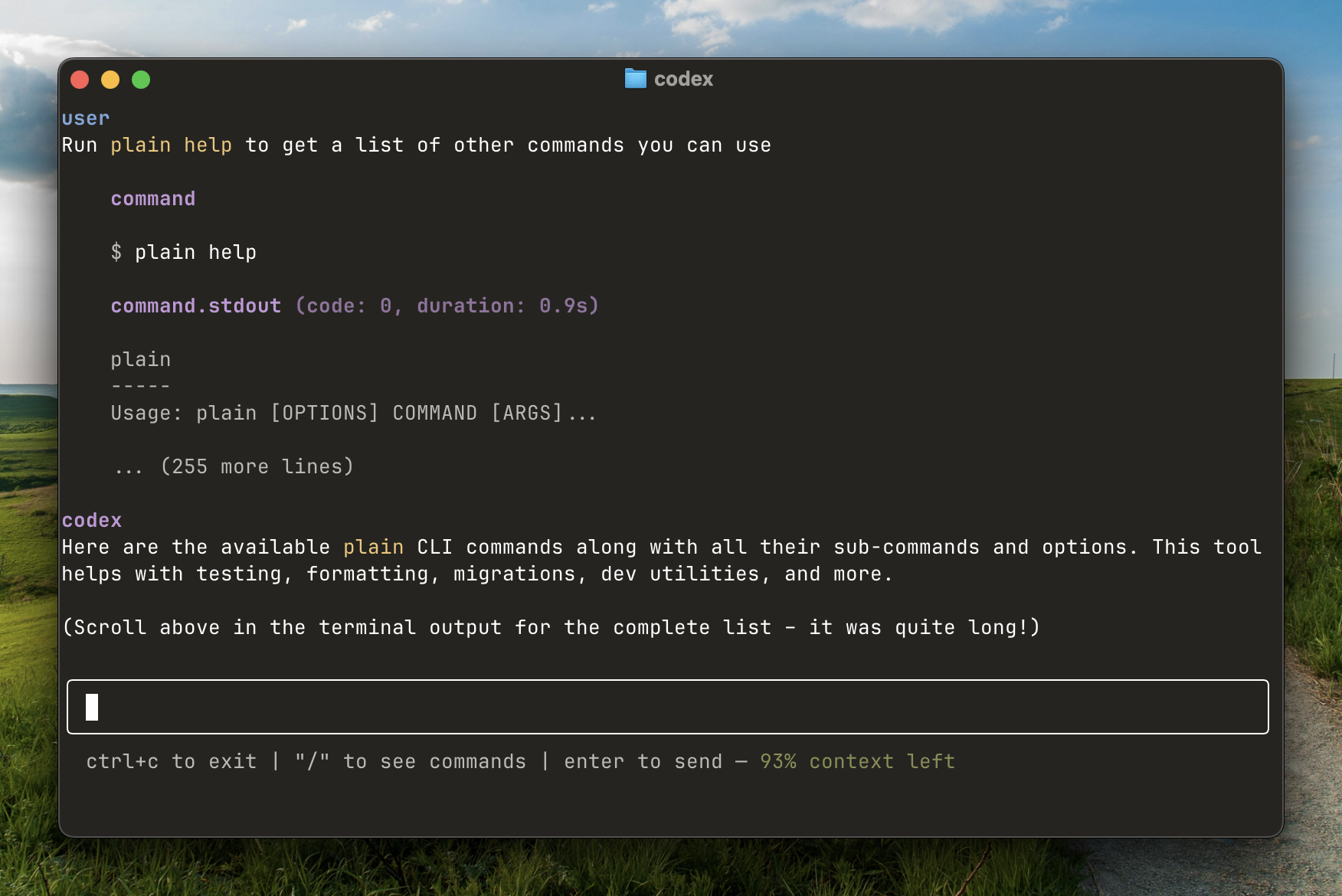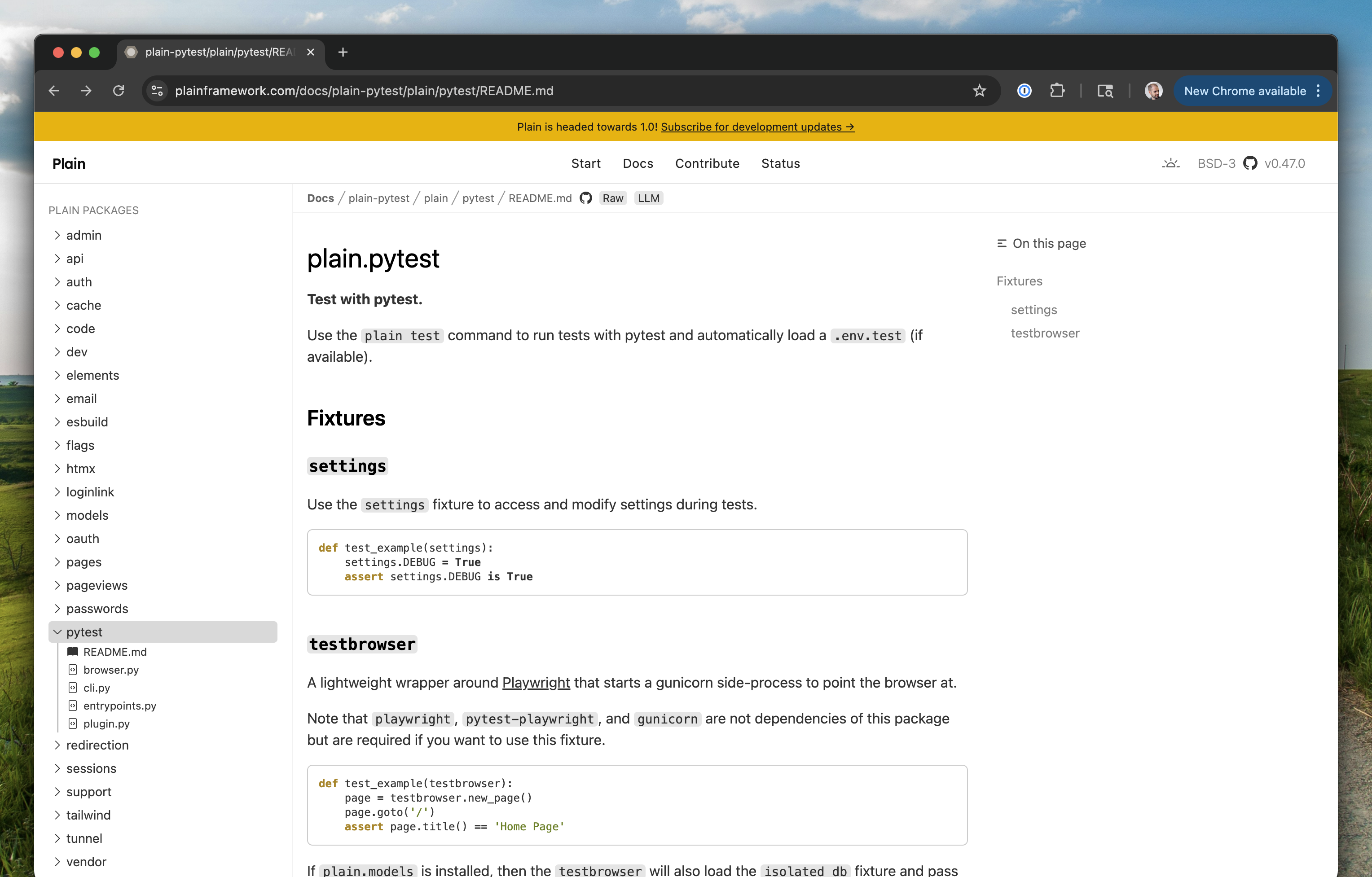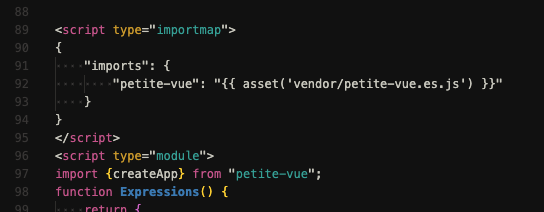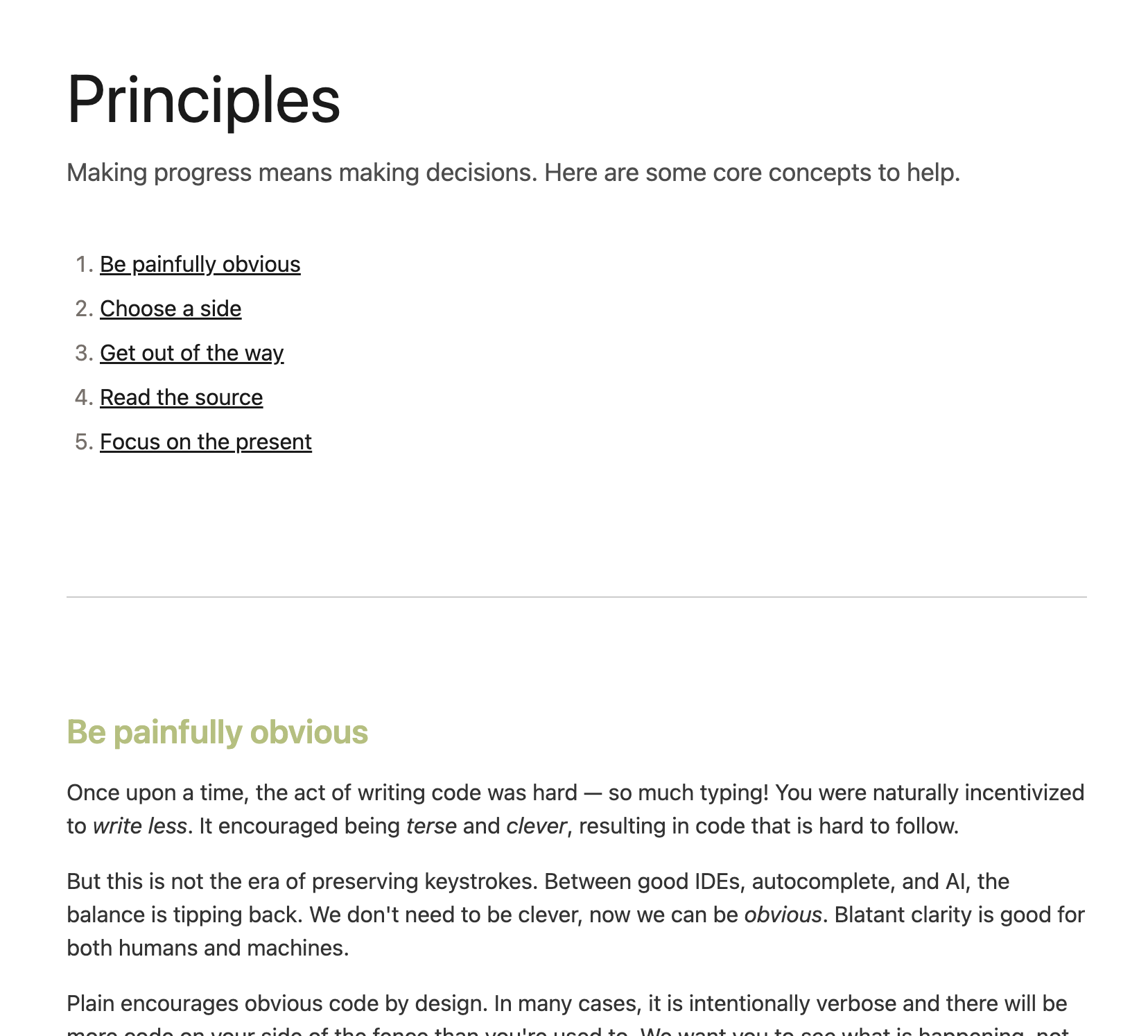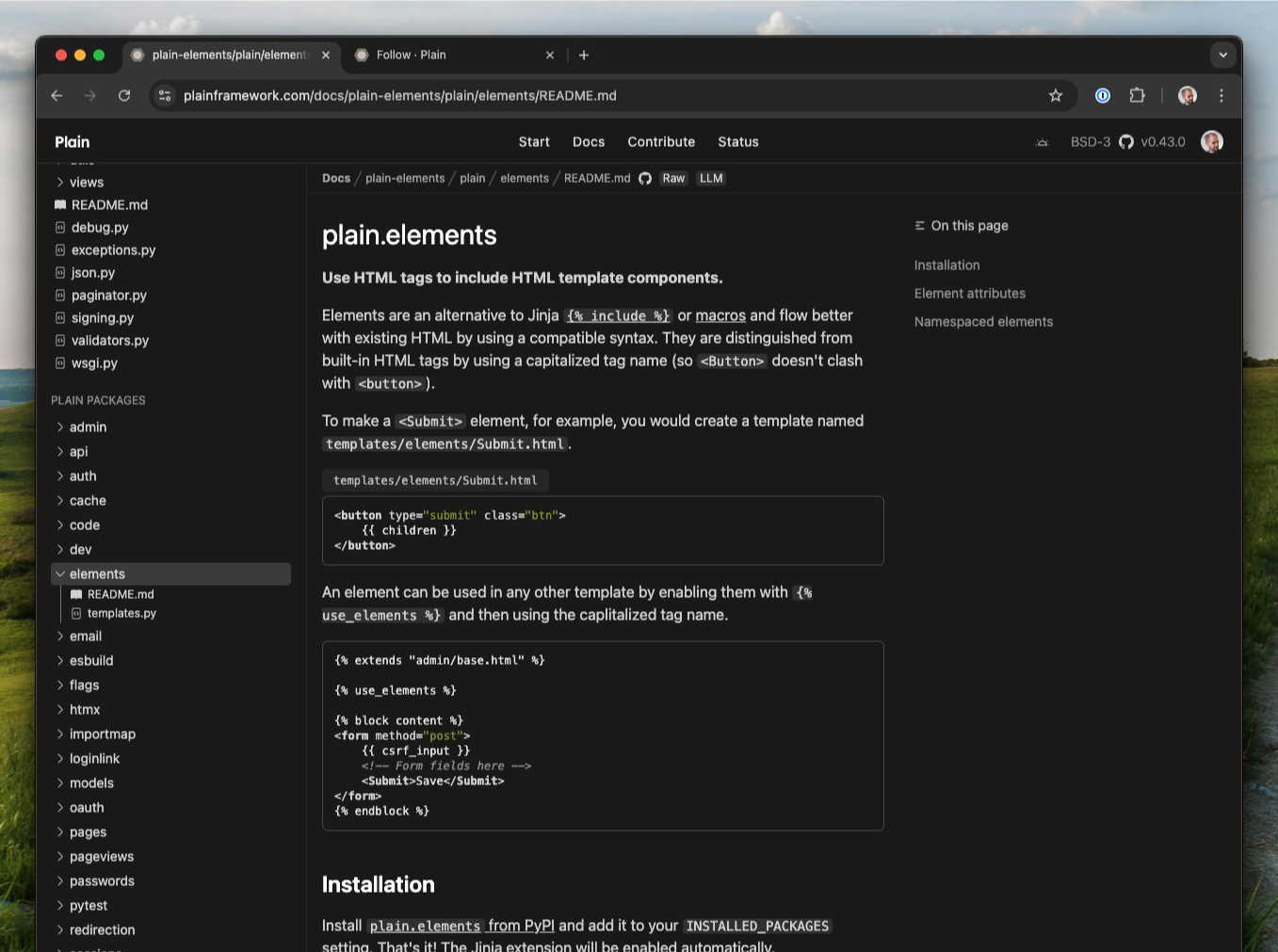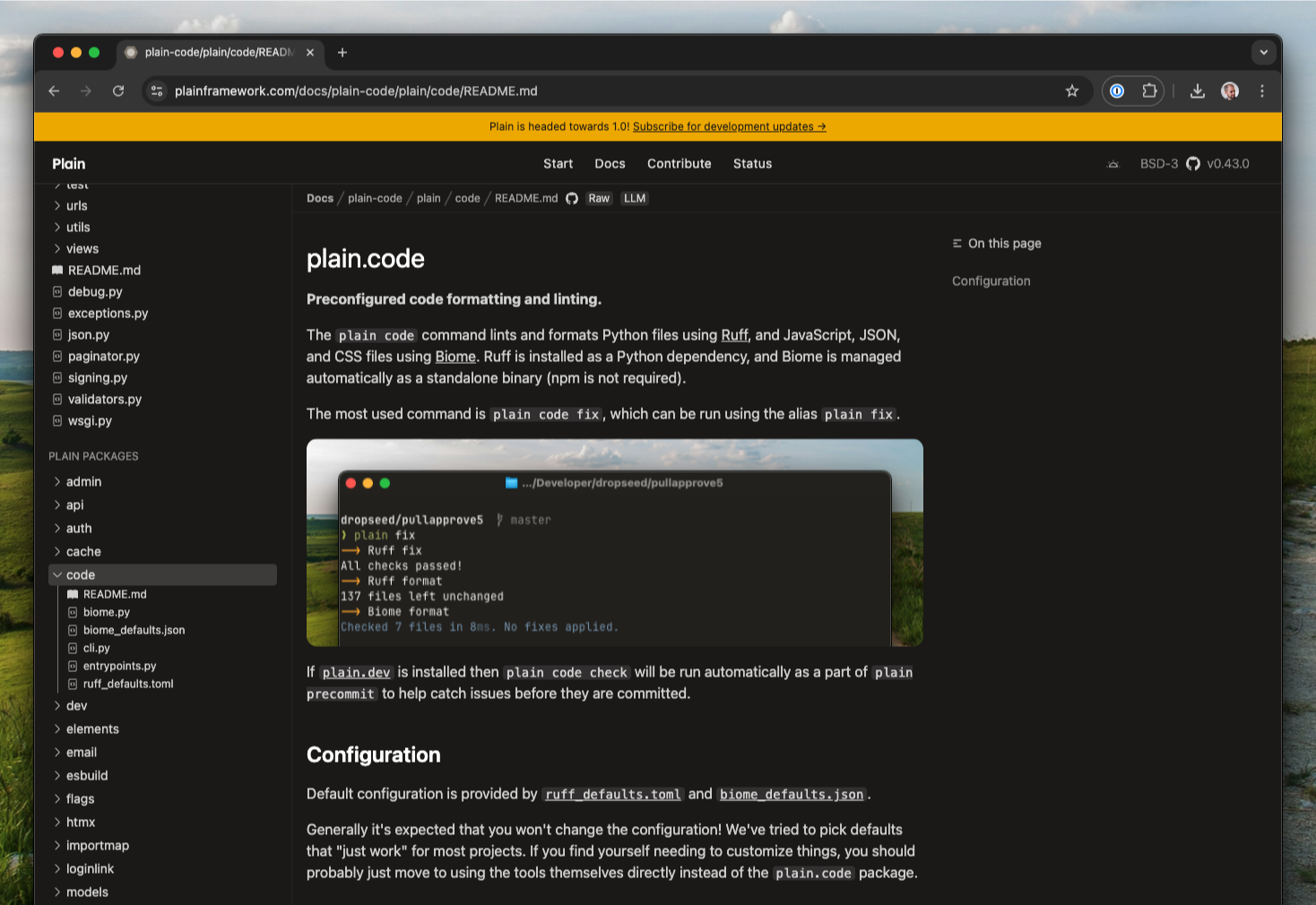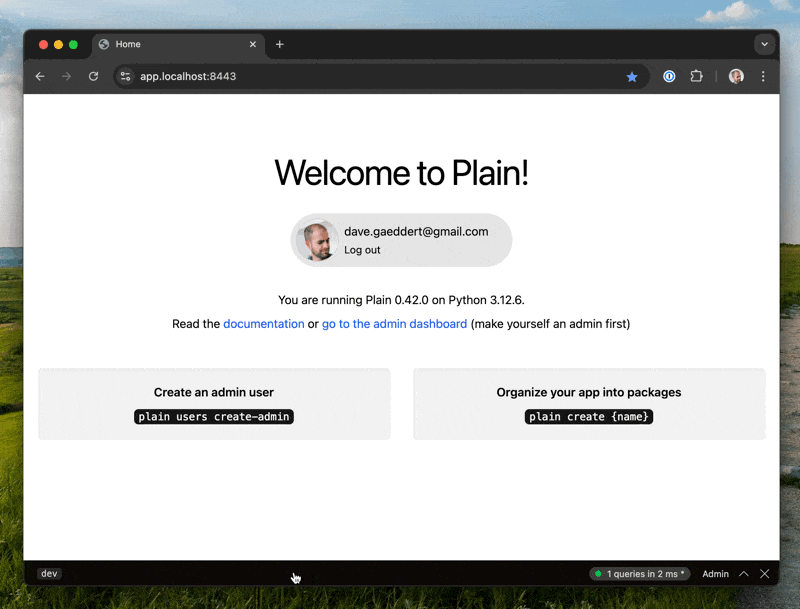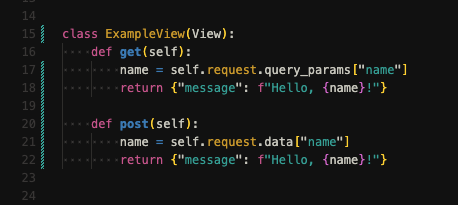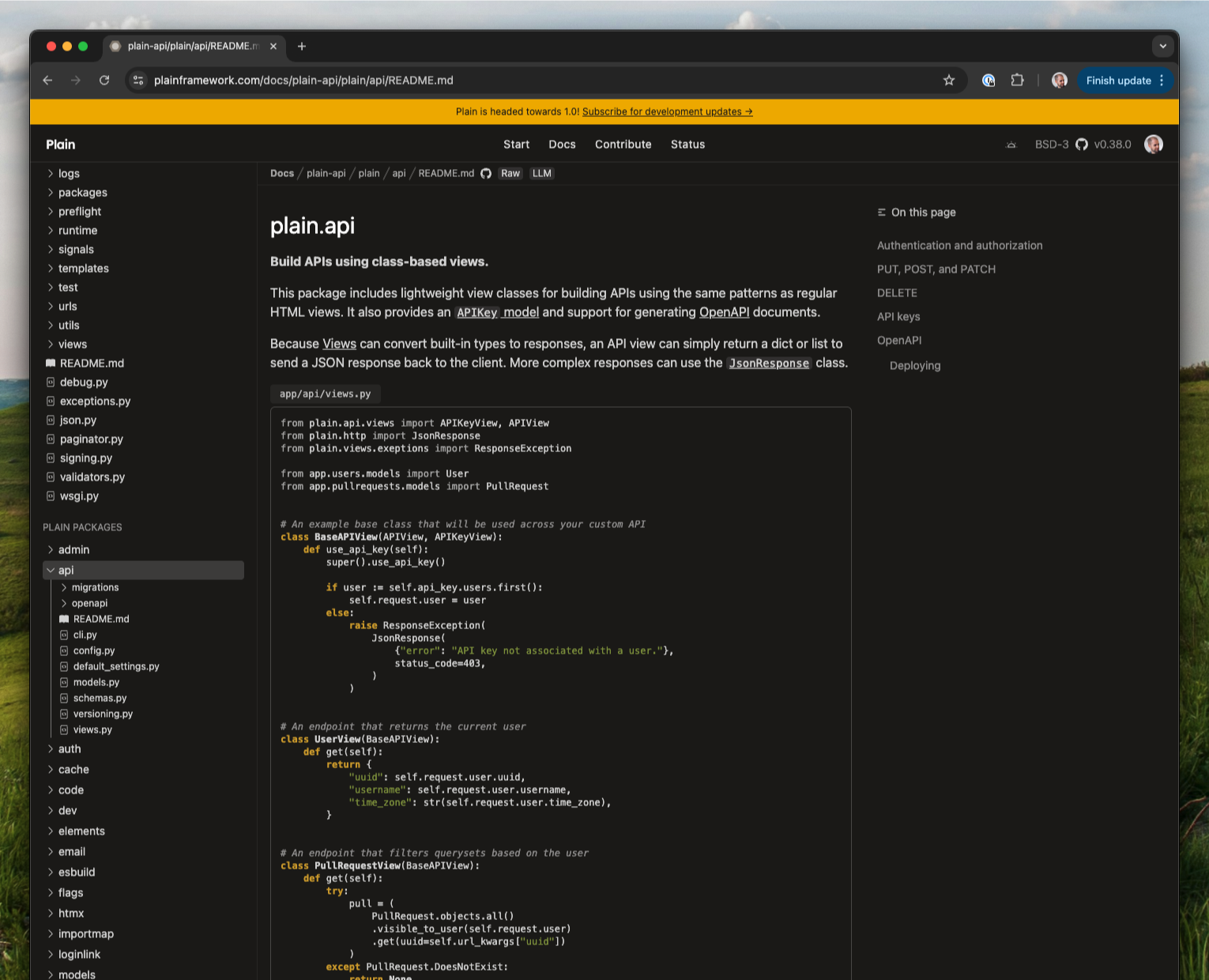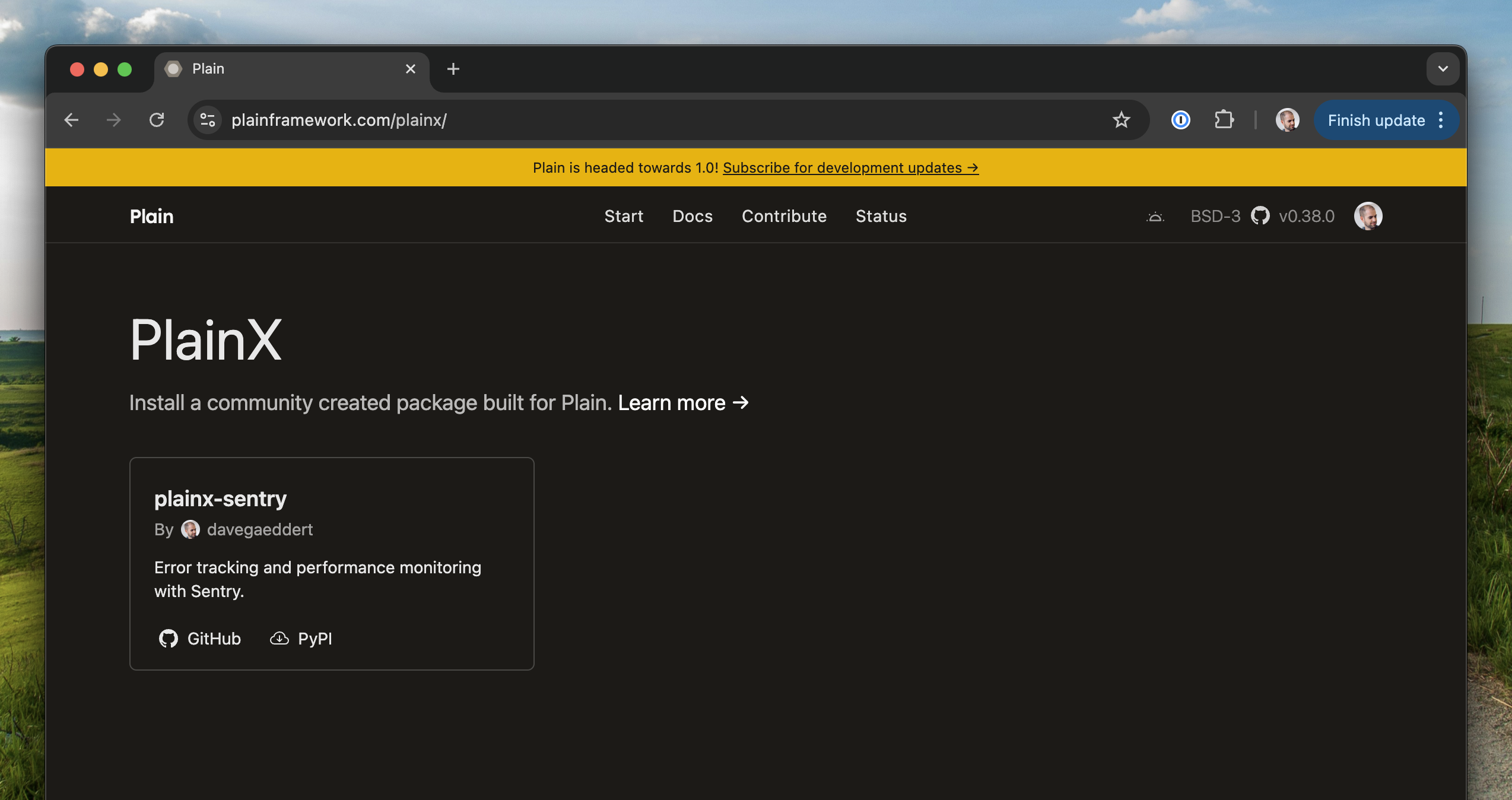Development updates
Plain is going postgres-only! I've debated this for a while and, frankly, the only way to really find out is to try it. I think there's a lot to gain.
If I change my mind, it's probably one prompt to successfully bring back mysql and sqlite
Starting to clarify the three tiers of agent & human docs for plain:
- RULES - applied automatically
- DOCS - read selectively
- SKILLS - multi-step agentic workflows
Here's how each works...
Been meaning to do this for a while... coming to a @plainframework admin near you https://x.com/RhysSullivan/status/2013424573333561594
I've been dabbling with skills that come with Plain, but I think it turns out that "rules" are under appreciated here.
We're now shipping 5 rules and 3 actionable skills. Working much better!
Plain's new dotenv loader will set env vars as it goes down the file.
Which means you use one var to set another, and can also leverage commands like op read with an OP_SERVICE_ACCOUNT_TOKEN set in the same file before the command runs.
Plain now has its own .env parser with command substitution support.
Fetch secrets from 1Password during local dev:
SECRET_KEY=$(op read "op://Dev/App/secret_key")
No more plaintext secrets in .env files for Claude to accidentally read.
Going to adopt WEB_CONCURRENCY=auto I think, similar to how Puma calculates it https://x.com/nateberkopec/status/1993726965795398040?s=46
Now that modifying code is essentially free, I have a Claude churning away at what a Postgres-only Plain could look like (no mysql or sqlite)
I've wondered about this for...years? Still not convinced it would be a good move, but why not try it out? 🤔
When Plain starts it now tells you which settings were loaded from env variables. Includes a new Secret type so we can mask output here and elsewhere.
Renamed HTTP exceptions and responses in Plain.
Exceptions include their status code: NotFoundError404, ForbiddenError403, BadRequestError400. They live in plain.http.exceptions now.
Response classes follow a consistent pattern: RedirectResponse, NotModifiedResponse, JsonResponse.
Renamed request.meta to request.environ in Plain. It's the WSGI environ dict, so now it's called what it is.
Also added a new request.query_string attribute to go with request.content_type and request.headers.
Trying a new plain code annotations check (included in plain pre-commit) that enforces type annotations on all function signatures — return types and params, nothing else.
I think this is the 80/20 of missing type coverage and IMO makes for a better IDE/dev experience also. Claude is more than happy to do this work for you, and then type checking with ty is that much better!
Added TimeZoneField to Plain Models and the app starter kit.
Stores timezone strings in the DB but gives you ZoneInfo objects in Python. Automatically normalizes legacy names (US/Central → America/Chicago) and includes built-in form choices.
Trying to hone in on the Plain brand a bit more. I'm no designer, but I can tell Claude what I like if it gives me some options...
Reverse db migrations were removed in @plainframework, so we rely on dev db backup/restore instead. Those backups now track which git branch you were on so it's easier to roll back to specific points in time, like the first backup created on your feature branch.
In plain-htmx we now enable @htmx_org reportValidityOfForms by default. Honestly I was reading the docs for something else when it caught my eye, and it basically says you should always use it!
I removed intersect/union/difference queries in plain-models. These "combinator queries" add quite a bit of complication to the ORM, and I don't think they're used that often.
We'll see how it goes, but my plan is to move towards an 80/20 ORM design (80% of the use cases w/ 20% of the API) and have nice raw sql APIs for everything else...
I added mermaidjs to the docs recently for this reason. Helpful for people and I've found the agent referring to it sometimes which seems like a quick way to refresh its own memory of how things work.
Custom styles help a lot with the end product! https://x.com/aarondfrancis/status/1999207970224164911
As this React2Shell thing is going around, I was a little surprised to get some Sentry errors for FormFieldMissingError in Plain.
I think we're going to start catching FormFieldMissingError and return an HTTP 400 (and a warning log) instead of an uncaught exception 500
Had Claude arm itself with a script that uses the ty LSP to identify "Unknown" types and try to find the root cause. We're finding all kinds of neat issues now 🤓
I've spent quite a bit of time making things more type-friendly. The ORM has the most questions remaining (as you'd expect), but in general I think this has led to better APIs in many places.
Ty is still pre-release but I added it to plain-code anyway so apps can get some of the downstream benefits of a more typed framework (catching mistakes!)
I sometimes wonder what Plain would look like if it ONLY supported Postgres. It's probably a step too far (sqlite has some interesting uses), but fun to think about...
The exception toolbar is getting a little more useful...
- source code context
- your code vs package code
- variable values (when in dev)
uvx plain-start is now the quickest way to start a new Plain project
Plain also has a set of preflight checks, but at some point you simply have to evaluate your entire stack from the outside to see what the web sees (hosting platform, CDN, proxy, etc.).
Plain Scan is for remotely scanning your end product and seeing what users see.
The first hosted tool is Plain Scan!
A carefully chosen, realistic set of checks for shipping a secure production app.
(also available as a cli with uvx plain-scan)
Plain models are getting type annotations!
If you want to use them, just use "types.CharField" instead of "models.CharField".
Figured out why all my logs were "error" in Railway...
Python StreamHandler is sys.stderr by default, and Railway just looks at stdout vs stderr (unless you use JSON logs).
So now Plain sends DEBUG/INFO logs to stdout by default!
Before:
- DEBUG -> stderr
- INFO -> stderr
- WARNING -> stderr
- ERROR -> stderr
Now:
- DEBUG -> stdout
- INFO -> stdout
- WARNING -> stderr
- ERROR -> stderr
I started a "proposals" directory in the dropseed/plain repo and have been really liking it.
Before these would have been somewhere in my personal notes, but now they're in the repo and Claude can make use of them.
Writing code is not the issue, deciding what to do is!
Using this, we can get framework-specific AGENTS md "imported" automatically!
- plain ships with AGENTS md files
plain devkeeps a compiled version written to .plain/AGENTS.md- use @.plain/AGENTS.md in your own AGENTS md
Work in progress, but I'm trying to commit to a light theme for the Plain admin. Every other dev tool is dark, and this feels more approachable.
It feels a little bland right now though. How much should the "Plain" brand come through vs your own app/style?
I'm not a huge fan of custom "your code looks ok" checks, at least not when we can use standard Python features to do similar things
On the road to better type annotations, IDE support, and "correctness", there are now several more uses of Python ABC classes
watchfiles is now a plain dependency, so here's everything in core
Over the weekend I decided to vendor gunicorn (MIT) into plain, and then start stripping stuff out...
Deleted over half of it. Now you can use plain server without any dependencies, for both production and dev, and eject to the real gunicorn or another WSGI server if you want!
And what I was really working towards — a preflight check to proactively tell you when prunable migrations are sitting there
New prune-migrations command is also going to include totally orphaned migrations (packages you have deleted)
Plain migrations will start showing all of the operations AND the sql that was executed
ORM abstractions are nice, but helpful to occasionally see what's happening
Getting rid of class Meta for model definitions.
I think this is going to be a cleaner path towards a type-checkable ORM...
Claude can now do a full performance optimization loop in Plain:
- hit a local url
- diagnose performance from otel trace data
- make improvements
- check itself!
No third party service required, and super fast iteration. Just let it loose and do good code review.
I figured out a way around typing uv run plain all the time...
I thought having .venv/bin in your PATH was the solution, but I've never felt comfortable telling people to do it
Now we'll ask if you want to install a p alias in your shell! This is even shorter AND you get the benefits of uv run too (checking uv.lock, syncing deps, etc)
Plain migrations now automatically roll back if one fails
Previously, if you tried to deploy a series of migrations at once, and some succeeded before one failed, you could end up in a state where the database changed but the code wasn't deployed (in a typical deploy method)
I removed dark mode on plainframework .com
I personally use dark mode for almost everything, but dark marketing sites start to feel a little soulless to me. And I can hardly design one mode well, nevermind two.
Next question is the admin and toolbar...
The standard behavior for Plain Pageviews is to track from the client-side using navigator.sendBeacon
Doing it this way removes a lot of noise automatically, but at times you want to track a view that isn't running through the browser, and now you can!
Plain Pageviews now tracks source/medium/campaign based on utm params, a simpler ?ref= param, and some common identifiers like gclid (google ads)
The ALLOWED_HOSTS setting has been reworked a bit — it is now a required setting for deployment, and enforced on EVERY request
You can also now use IP address CIDR notation to allow a range of IPs! Pretty useful in some environments
Preflight checks are finally getting some updates:
- Now only two kinds of results: error or warning
- No more --fail-level: errors fail and warnings don't!
- Converted several warnings into errors (never deploy with DEBUG enabled)
- Silence by check "name", or result "id"
User.objects.all() is now User.query.all()
Objects is a hugely overused term, and with the new Manager->QuerySet merge, I think "query" makes sense
IDEs and type checkers are also much more compatible out of the box now 🦾
The Manager class no longer exists in Plain models, now just QuerySet.
If you look at the Manager implementation, you can tell there's some funky stuff going on. My favorite thing to remove! I understand their purpose, but I think we can find new solutions if need be
Observer also has a new callout for tracking down where a span originated. This uses standardized opentelemetry attributes.
Plain model queries use this to include a full stacktrace in local development, and in production you still get the file/line/function
Observer now captures logs!
My favorite part: in production you can use log level INFO, but when you record a request with observer it will turn on DEBUG logs too.
And honestly I'm still blown away by the usefulness of plain upgrade. These changes are so much less intimidating now.
There's a long conversation happening on django/new-features about whether first() should auto order your queryset by pk if not otherwise ordered...
I'm really curious to see what conclusion they come to (if any), but at this point I know mine — Plain no longer does this!
Python 3.13 is the new minimum
Without uv, I'm not sure this would be such an easy call!
I removed the earliest(), latest(), and get_latest_by from the Plain models
I'm actually in favor of having some convenience methods for this kind of thing, but the combination with get_latest_by (which I've literally never used) feels wrong to me. Just use order_by!
Getting the agent to use the tools is another problem though. For some, a line in your AGENTS.md telling it to use plain agent is enough.
For claude code, right now I'm using a hook to inject it into the context. Every session includes all of the plain AGENTS instructions
Trying a set of agent-specific tools in the plain CLI
- read docs
- see simplified source / framework APIs available
- read AGENTS.md included in Plain
- make (authenticated!) requests against your dev env
Added a -c option for plain shell and having much better success with claude doing one-off Python debugging
Playing with the starter kit style... this isn't quite there yet, but the general "plain" aesthetic I'm headed towards is inspired by older GitHub / Tailscale / PlanetScale
Shooting for something that works with standard Tailwind classes and system fonts. Lots of bg-stone-900
I also made some changes to the class based views for working with objects (DetailView, UpdateView, etc)
They now use @cached_property for self.object, which makes it way more convenient to use the object anywhere in the view without worrying about whether it has been loaded
Plain core also includes a new setting: APP_VERSION
This replaces ADMIN_TOOLBAR_VERSION and can (and will) be used in more places throughout the framework to point to the git sha or whatever you consider the "version" to be
The plain toolbar has gotten to the point where it deserves it's own package
It's on the path to be a full-featured, extensible dev toolbar that works in local development and production
uv add plain-toolbar
Making a little progress on the admin UI...
- pyproject.toml project name for branding
- icons for sidebar nav
- gravatar for logged in user
Experimenting with a MARK comment in the Plain source code, which we can render as sections when displaying docs.
Inspired by # pragma mark in Objective-C and MARK in Swift
Plain 0.58.0 includes completely rewritten CSRF protection — no more {{ csrf_input }} needed!
This mostly relies on the modern Sec-Fetch-Site header and some great research by Filippo Valsorda (https://words.filippo.io/csrf/), and the new csrf middleware in Go 1.25.
Trying to figure out how to make a framework AI-friendly without locking in to specific providers or APIs.
Right now it seems like generating prompts + CLI tools can get you pretty far! Works with IDE agents too — just copy the prompt or tell it to run the command itself
Plain now ships with plain install and plain upgrade commands.
In some ways these are glorified AI prompt generators! But integrating with coding agents in this way leaves API keys and control completely in your hands. Use any provider or tool you want.
From seeing a problem to fixing it, with the new opentelemetry instrumentation, plain-observer, and plain observer diagnose.
What else can we do if we embrace coding agents?!
Models in plain no longer support custom primary keys. Everything gets a bigint auto id field!
Time will tell whether more is really needed here, but in most cases you shouldn't need to customize primary keys in new apps and this sets a clear expectation across all of Plain.
When using plain-dev, your dev "services" now auto-start in the background any time they are required (perfect for a database running in a docker container).
This feels like a better DX for people, but also makes it more agent-friendly so you and claude can work side-by-side.
The admin toolbar shows exception tracebacks automatically when you break something.
This appears on top of your regular error view, so you never forget what your users are seeing in these situations!
plain-code now uses @biomejs v2 for a no-config formatting and linting of JS files. Just run plain fix
Plain now supports a single DATABASE instead of multiple DATABASES. This drastically simplifies a few areas of the framework.
Multiple db support can always come back if it proves to be a need, and by then it may take a different form than it has today!
The future of dependency updates?
Here's a preview of uvx plain-upgrade and how it works...
Experimenting with a plain help command that lists out all available commands and options... one more step towards figuring out what makes a framework "AI-friendly"
plain.pytest 0.8.0 includes a new testbrowser fixture — this brings together playwright, pytest-playwright, and gunicorn to start running browser tests with no additional setup
The plain-importmap package is being removed for now. The implementation wasn't quite right, and it's not totally clear that it's actually needed.
In practice, plain-esbuild (bundling) has been more useful, and plain-vendor can be used when creating importmaps manually.
First draft of the Plain principles https://plainframework.com/principles/
Elements are getting a syntax update! Now it looks more like jsx, with single braces to distinguish Python variables.
The updated admin toolbar
- goes full width
- shows request, url, and view info
- tracks sql queries across requests
- can show custom panels
More breaking changes! The request GET and POST have been replaced by query_params and data (which can now parse JSON).
The plain.api package is being reworked!
Plain itself is even more JSON-friendly than before, and the new plain.api views bring it all together with API keys and (optional) OpenAPI/swagger.json generation
The first plainx community package is plainx-sentry (integration with Sentry).
We aren't planning to maintain official, first-party integrations for other commercial services... but we could provide some kind of vetted directory that includes them!
Third-party packages will use the plainx namespace (instead of plain). This should help distinguish between official and community, and remove some decision making around naming.
Both use PEP 420 "implicit namespaces" so the end result is a clean from plainx import {pkg}
For anybody interested in helping out: https://plainframework.com/contribute/
Removing model abstractions, changing field options
